Bay left in limbo!
FRUSTRATION AND anger has reached boiling point among Hawke’s Bay horticulturalists at the lack of action by the Government in dealing with the Cyclone Gabrielle recovery operation.

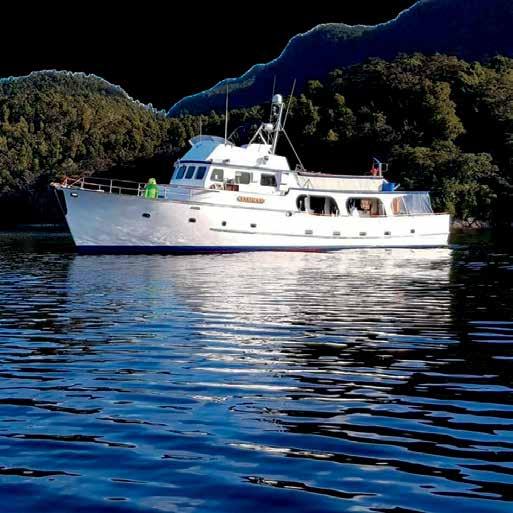

Horticulture NZ chair Barry O’Neil told Rural News that there are a lot of angry growers in Hawke’s Bay who feel abandoned by the Government.
“HortNZ is very disappointed. While the Government initially provided some funding to clean up devastation caused by the cyclone, it hasn’t followed up with a promised full recovery package.”
Growers whose orchards were either wiped out or badly damaged are being left in limbo not knowing what Government assistance may be available to help them get back on their feet, or whether they will simply have to walk off their land.
O’Neil says when the Minister of Finance and Cyclone Recovery Minister Grant Robertson met with growers in early April, there was an expectation that there would be an announcement about a recovery package soon after. However, O’Neil says a month on and he’s been given no indication of an impending announcement.
“We have been collaborating with ministers and officials involved. I do understand that this is a complex situation here with an infrastructure rebuild cost, as well as the growers,” he told Rural News
“We also understand that the budget discussions may have delayed this to a certain extent. But the longer it takes them to land this package, frustration will continue to grow.”
O’Neil says HortNZ is aware of how hard things are for growers and is doing all it can to try and get the Government to act quickly.
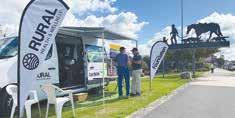
He says Cyclone Gabrielle has come on top of three difficult years caused by Covid, which has seen a lack of labour to maintain and pick fruit leading to quality problems.

He adds that shipping delays and other global disruptions have made the situation worse.
O’Neil says it appears that the Gov-
ernment is waiting for the banks and insurance companies to step up as well. He acknowledges that the issue is extraordinarily complex and that lawyers are involved to try and sort out some of the complexities such as – if the land is leased – who pays for the cleanup.
He points to the 2004 Manawatū

floods, where the Government moved quickly and supported growers and farmers. O’Neil concedes that the present crisis is more widespread with large areas of the North Island affected.
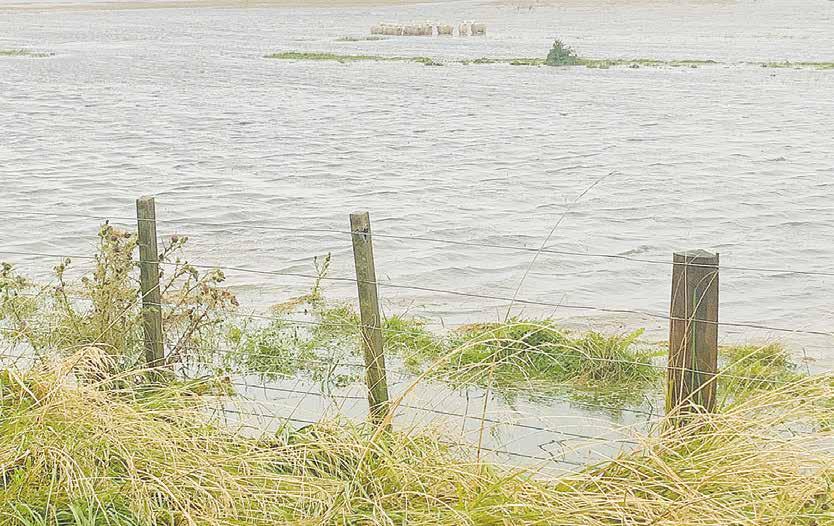
“Frustration is very high. We want the Government to show the leadership it needs to and was elected to do.”
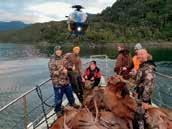
MAY 9, 2023: ISSUE 775 www.ruralnews.co.nz TO ALL FARMERS, FOR ALL FARMERS NEWS Giving back to the rural sector. PAGE 12 MACHINERY & PRODUCTS Enhanced Hilux hits the spot. PAGE 26 AGRIBUSINESS New red meat campaign dots down. PAGE 14 EXPLORE FFiordland iordland C H A L K Y S O U N D & P R E S E R V A T I O N I N L E T H E L I C O P T E R T R A N S P O R H U N T I N G / D I V I N G F I S H I N G / K A Y A K I N G S I G H T S E E I N G F O R B O O K I N G S C O N T A C T U S + 6 4 0 2 7 4 3 2 8 0 6 6 i n f o @ t a k a p u c h a r t e r s . c o . n z w w w . t a k a p u c h a r t e r s . c o . n z ESCAPE FROM THE REST OF THE WORLD I N C o m e a n d e x p e r i e n c e t h i s r e m o t e l o c a t i o n , a n d t a k e a r e a l b r e a k f r o m t h e l o n g h o u r s o f d a y t o d a y l i f e . R e c h a r g e b y s p e n d i n g s o m e t i m e i n t h e e i g h t h w o n d e r o f t h e w o r l d . T H E U L T I M A T E V O Y A G E O F D I S C O V E R Y T R I P S B U I L T S P E C I F I C A L L Y T O F I T Y O U
PETER BURKE peterb@ruralnews.co.nz
Farmers and growers in the Hawkes Bay are frustrated and angry with a lack of Government leadership following the destruction of farms and orchards in the region by Cyclone Gabrielle back in February. PHOTO CREDIT: PAUL MCGILL
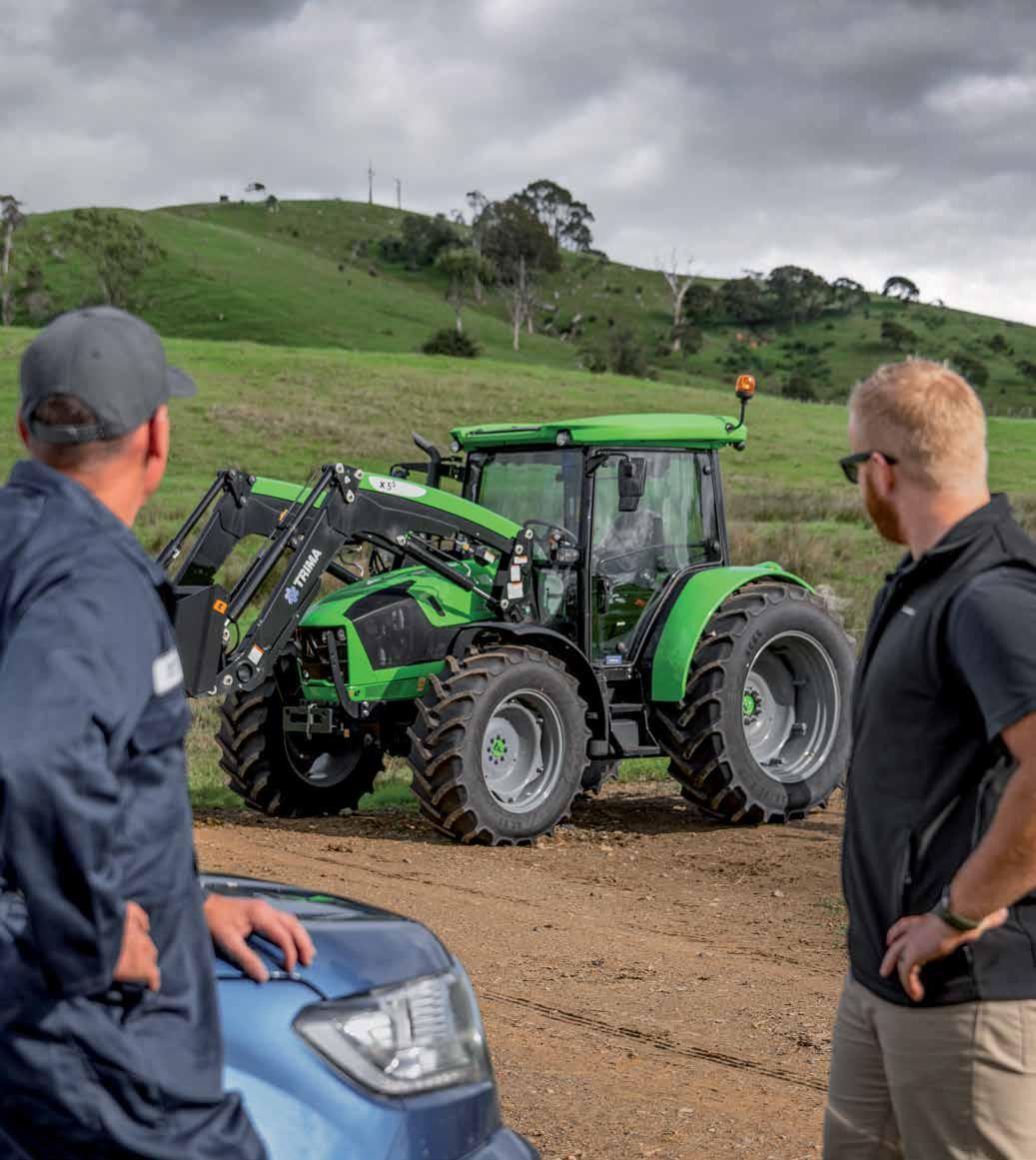
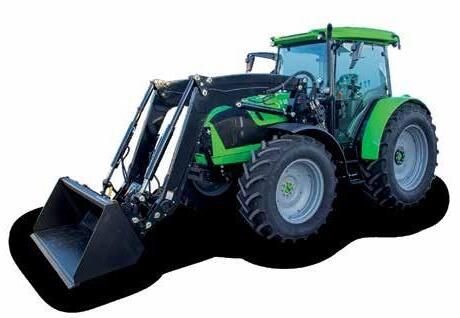

6 MONTHS DEFERRED PAYMENTS Ask us about our flexible finance packages, there’s one that’ll suit your business. Reduce your fuel costs and get better traction to ground that’ll pay you back quicker than you expect. Take delivery of your Duetz-Fahr tractor to get you through the busy period and don’t start payments for 6 months. deutz nz TOUGH SEASON? LET’S CHAT ABOUT HOW WE CAN HELP. * Terms, conditions and standard lending criteria applies. Limited time offer while stocks last. Power Farming NZ WHANGAREI 09 438 9163 PUKEKOHE 0800 570 571 TAURANGA 07 543 0021 MORRINSVILLE 07 889 5059 WHAKATANE 0800 77 88 99 TE AWAMUTU 07 870 2411 ROTORUA 07 349 6528 GISBORNE 06 868 8908 HAWERA 0800 480 309 HASTINGS 06 879 9998 FEILDING 06 323 8182 MASTERTON 06 370 8240 NELSON 03 544 5723 BLENHEIM 03 573 7089 GREYMOUTH 03 768 4370 CHRISTCHURCH 03 349 5975 ASHBURTON 03 307 7153 TIMARU 03 687 4127 DUNEDIN 03 489 3489 GORE 03 208 9395 INVERCARGILL 03 215 9039
Waiting for answers
the ETS, saying it isn’t fit for purpose.
DAIRY INDUSTRY leader Jim van der Poel still believes farmers going into an Emissions Trading Scheme (ETS) will be “a stupid thing”.
“It will just become another tax,” he told Rural News
Van der Poel says farmers are waiting for the Government to spell out its position on an industry emissions pricing scheme.

“We are waiting to hear what happens going forward,” he says.
A new Prime Minister and recent weather events around the country have changed the Government’s priorities, according to van der Poel.
He has real concerns that, because of delays in the process, there will not be enough time to implement the scheme before the Government’s intended start date of January 1, 2025, and as a result, farmers may end up in a processor-level system through no fault of their own.
Van der Poel believes the scheme launch date would need to be pushed back to allow everyone more time.
The Government has proposed bringing in split-gas, farm-level emissions pricing from 2025 in a world-first scheme.
However, the Government is concerned its farm-level scheme may not be ready by 2025 and proposes a processor-level levy as a backstop alternative to the ETS, which farmers oppose.
DairyNZ, with other primary sector stakeholders, is part of He Waka Eke Noa – an industry group pushing for a practical and cost-effective system for reducing emissions at the farm level by 2025 and a farm-level pricing system acceptable to all farmers.
In December last year, the Government made changes to its emissions pricing plan, which includes confirmation the price will be set at the lowest rate needed and fixed for five years to give farmers certainty, and better recognition for on-farm planting. Farmers
will also be able to manage and report their emissions as collectives.
While the dairy sector welcomed the changes, it pointed out several issues that needed more work.
The industry responded to the changes and now awaits the Government’s reply.
Van der Poel says he expects the

Government to “come out soon”.
Meanwhile, the latest draft advice from the Climate Change Commission (CCC) also emphasises the need to firm up an emissions price by 2025.
In its latest report, the commission also said there is too much reliance on forestry to offset emissions.
They also want to see a shake-up of
While DairyNZ is still mulling over the draft report, Beef+Lamb NZ (B+LNZ) claims it vindicates the sheep and beef sector’s demands for urgent limits on the ability of fossil fuel emitters to offset their greenhouse gas emissions by planting trees on productive farmland.
“The Climate Change Commission rightly points out that the current policy settings are incentivising over-planting of trees on farmland, and that if this is not fixed, it will undermine New Zealand meeting its emissions reduction targets effectively and also have significant negative consequences for rural communities,” says Sam McIvor, chief executive of B+LNZ.
“B+LNZ has said for a long time that there is a place for forestry in meeting New Zealand’s climate change commitments. The integration of trees within farms could be a win-win and go some way towards meeting New Zealand’s climate change objectives, whilst maintaining a vibrant and profitable red meat sector.
“But the wholesale conversion of productive sheep and beef farms into carbon farms is a significant problem with fossil fuel emitters simply offsetting and not doing enough to use the currently available tools to reduce their emissions in the first place.”
McIvor claims New Zealand is an outlier internationally when it comes to allowing forestry offsetting in the proposed ETS.
B+LNZ will shortly be releasing a report that highlights this disparity and reinforces the need for urgent change.
“The red meat sector is also one of the few parts of the economy that has been doing the heavy lifting in reducing emissions,” says McIvor.
“The sector has cut its gross emissions by 30% since 1990 and has one of the lowest carbon footprints in the world.
“We’ve invested millions in technologies to reduce greenhouse gas emissions like low methane sheep.”
RURAL NEWS // MAY 9, 2023 NEWS 3 HEAD OFFICE Lower Ground Floor, 29 Northcroft Street, Takapuna, Auckland 0622 Phone: 09-307 0399 Fax: 09-307 0122 POSTAL ADDRESS PO Box 331100, Takapuna, Auckland 0740 Published by: Rural News Group Printed by: Inkwise NZ Ltd CONTACTS Editorial: editor@ruralnews.co.nz Advertising material: davef@ruralnews.co.nz Rural News online: www.ruralnews.co.nz Subscriptions: subsrndn@ruralnews.co.nz ISSUE
www.ruralnews.co.nz NEWS 1-12 AGRIBUSINESS 14 HOUND, EDNA 16 CONTACTS 16 OPINION 16-18 MANAGEMENT 20-21 ANIMAL HEALTH 22-23 MACHINERY AND PRODUCTS 24-26 RURAL TRADER 26-27
775
SUDESH KISSUN sudeshk@ruralnews.co.nz
DairyNZ chair Jim van der Poel says farming going into an Emissions Trading Scheme would be stupid. Manufactured By:
Advantage Plastics Limited 0800 668 534 or info@adplasnz.com
Is augmented reality the future of farming?
IMAGINE A farmer being able to tell a paddock’s pasture cover and dry matter content just by looking at it, or accessing information about a cow’s body condition score in the same way.
Augmented reality (AR) glasses, used in a recent pilot project involving DairyNZ and Lincoln Agritech, has the potential to make this possible.
AR is a fast-growing technology that adds information to what people can perceive with their senses. For example, using an AR headset, a farmer can see any relevant information, voice recorded data or connect with an off-farm expert who can also see what the farmer is looking at.

Farmers and rural professionals at DairyNZ’s Farmers’ Forum in Waikato heard that DairyNZ has collaborated with Lincoln Agritech to investigate how AR could make a difference on dairy farms, including potential benefits and limitations. An investigation is being carried out into how AR technology can be used for pasture management, farm machine maintenance and body condition scoring.
DairyNZ says the pilot project has demonstrated the potential of AR technology.
“Further opportunities for supporting onfarm tasks, training and remote supervision will be explored,” it says.
The pilot project on a Canterbury farm allowed a farmer to use AR equipment to identify and display useful data about his paddocks. A team with no experience in condition scoring was able to assess the BCS of cows using information loaded into the AR headset. The date was recorded with a few swipes of the finger in the air. In another test case, the AR headset was programmed to visually
locate the grease points on a tractor.

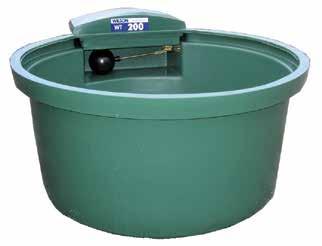

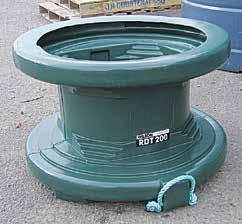

The AR technology was one of many new science, technology and farming practices discussed at the Farmers’ Forum, attended by about 300 farmers and rural professionals. They also heard about options to reduce methane emissions, using plantain to reduce N loss, strategies to remain profitable in a high inflation environment and harnessing new technology. Snapshots on research on boosting cow fertility, improving animal wellbeing and addressing
environmental challenges were also presented by DairyNZ scientists.
DairyNZ chair Jim van der Poel told Rural News that he was happy with the turnout. He says the event gave farmers the opportunity to engage directly with scientists involved in research and to find out what’s going on.
Speaking at the Farmers’ Forum, van der Poel says science and farmer innovation will once again find solutions to challenges facing the dairy sector. He says the dairy sector is facing different challenges today than what it faced three decades ago.
“The research we did in the 80’s and 90’s
helped dairy to outcompete other land uses and we saw dairy expand, especially in the South Island.”
The dairy sector grew by 100% between 1985 and 2015. This meant dairying became more intense and covered a larger area.
Van der Poel says this increased dairy’s environmental footprint and the number of high-quality people needed to run those operations.
“And once again science and farmer innovation will be a key factor in finding solutions.”
He says DairyNZ is currently in the decade of research into methane reduction, nitrogen leaching and changing the job on farm through modern farming practices and technology.
Van der Poel believes dairying has a great future.
“We are globally recognised for the quality of what we produce.
“The commitment to funding the science we need to do to resolve today’s issues, together with our innovation and resilience, will help us get there.”

RURAL NEWS // MAY 9, 2023 4 NEWS
SUDESH KISSUN sudeshk@ruralnews.co.nz
AR
PHONE 06 357 8562 WILSON www.wilsonplastics.co.nz AVAILABLE AT YOUR LOCAL FARM OR IRRIGATION STOCKIST PORTABLE TROUGHS... WT 75 WT 200 BREAK-FEEDING... 200 litres specially designed for break-feeding. They can be towed when full and also can reel in metres of alkathene. RDT 200 PHONE 06 357 8562 WTD 150 • Ideal between paddocks • Ballfloat fitted WT 75 • Easy to handle • Ballfloat fitted WT 200 • Tough and durable • Ballfloat fitted PORTABLE TROUGHS AVAILABLE AT YOUR LOCAL FARM OR IRRIGATION STOCKIST
“Further opportunities for supporting on-farm tasks, training and remote supervision will be explored.”
technology was one of many new science, technology and farming practices discussed at the Farmers’ Forum.
No money, no recovery
Some just have a generator, a BBQ and portaloo and that is their existence.”
A LEADING Hawke’s Bay orchardist says claims that the recovery is going well are simply not true.
Paul Paynter of the Yummy Fruit company told Rural News there is no recovery because there is no money for it.
He says while the Government has put up money for the clean-up, there is now a hiatus with no news on what it will do next. He says a lot of growers are living in a disaster zone with no money and no hope.
“A lot of small growers have lost their homes, their orchards.
“They owe the banks money for seasonal finance and a lot of them are living in caravans, containers or garages.
Paynter says growers wake up in the morning to piles of silt and they are just pottering around, but they don’t have any money to get heavy equipment to clean up. He adds that the funding for the clean-up is inadequate for the scale of the problem the people are facing.
Paynter says action is needed fast.
“People just don’t know what to do with their lives and some are facing the prospect of just walking off their land. Others simply don’t know what financial help may be available,” he says.
“There is no pathway – there is inertia here
because of an absence of money and no clear direction. Two months on and it is not good enough.
“Everybody in Hawke’s Bay who is significantly affected by the cyclone is for all intents
and purposes broke,” he says.
Paynter says the issue in Hawke’s Bay is that the province’s economic engine is broken. He says viticulture, horticulture and the cropping people have all suffered, with
some of the latter out of pocket to the tune of tens of millions of dollars.
According to Paynter, the banks have been somewhat supportive.
“Their approach is that they don’t give any money to you for clean-
up – they think that’s the Governments job. They will also be wary of lending if there is uncertainty about when any loan will be paid off.”
He says it would seem that there is an impasse with the banks looking to the Government to support industry and the Government looking to the banks to support industry.
“So, there is a bit of a Mexican standoff and I think we are the Mexicans standing in the middle,” he says.
Paynter says he’s aware that there are some legal battles taking place between growers who have leased land and the owners of the land about who pays for the cleanup. As he sees it, the law is quite clear.
“If you look at the
Property Law Act, it states in schedule three that in a natural disaster where you have flood, fire or anything like that, it is the responsibility of the landowner for the cleanup and not the lessee,” he explains.
“It appears to come from a world that imagines a very rich landowner and an impoverished peasant (which might not be the case in reality) – but the landowner gets stuck carrying the can for the clean-up.”
Paynter believes the situation in Hawke’s Bay is of national importance because it’s a massive food-producing region generating millions of dollars for the region and the nation as a whole.
“We need to get the regional economy back on its feet,” he says.

100% MADE IN NEW ZEALAND
RURAL NEWS // MAY 9, 2023 NEWS 5
PETER BURKE peterb@ruralnews.co.nz
Paul Paynter says recovery action is needed fast.
We’re here for the good of the country. As a 100% NZ-owned mutual, we’re not here for the bank accounts of overseas owners. We’re here for the New Zealand farmers and growers who are our members. Ask around about us, or better still give us call on 0800 366 466.
From orchard mapping via drone technology to fully-electric farm bikes, new innovations continue to go from prototype to market launch at the largest agribusiness event in the southern hemisphere; Fieldays®

Through the bringing together of industries and institutes, start-ups and experts, innovators and their marketplace, Fieldays continues to be the ultimate hub of challenge-solving innovation. Start getting inspired by new ideas at Fieldays 2023.
GET YOUR TICKETS

New regulations may lead to farmer exodus
nance.
A NUMBER of Northland dairy farmers are thinking of leaving the industry due to the cost of environmental farm plans that they will need to have in place under Essential Freshwater rules.
In one case, a farmer was told it would cost $260,000 to bring his effluent system up to the standard required, Northland Federated Farmers’ president, Colin Hannah told Auckland Federated Farmers Conference.

“They don’t want to get into that sort of debt,” he said.
Hannah added that farmers had no other supply option but Fonterra and some just under aged 60 were being refused loans by their banks, so their only option was to sell.
Paul Melville, the federation’s new general manager of policy and advocacy, said the plans
should be a voluntary tool for councils to use, rather than all property owners with more than 20 hectares needing one.
His guesstimate of the cost of the plans was $6,000 per farmer and there was a shortage of people qualified to certify these once they were written. A number of farmers at the meeting objected to having the plans imposed on them, saying they didn’t need to be told what to do.
Meat and Wool chairperson, Edgar Henson, said the Ministry for Primary Industries (MPI) and Ministry for the Environment (MfE) should be told to produce the plans “or otherwise bugger off”.
“If they can’t produce a template, they don’t know what they’re doing.”
Fed’s national freshwater spokesman, Colin Hurst, said Canterbury farmers had been dealing with the plans since
commissioners were put in place on Environment Canterbury (ECan).
“It’s nothing new to us.”
But the $6,000 per farmer cost multiplied by around 35,000 farmers showed the extent of “the
money being sucked out of the rural economy”.
Farmers were also hot under the collar about the state of rural roads with a remit unanimously passed to go to national conference that Feds work with Waka Kotahi
to ensure water tables and culverts were maintained. Dairy chairperson, Rosemarie Costar, said Waka Kotahi was being more prescriptive as to where councils could spend their funding, and this had caused
FORESTRY WORKSHOPS FOR FARMERS
THE NEW Zealand Farm Forestry Association is running 18 extension workshops throughout New Zealand in May and June to target potential tree growers.
National president of NZFFA,
Neil Cullen says the timing is ideal for farmers who are interested in diversifying their long-term farm income.
“Trees are not just about the timber potential. They also protect
the land and store carbon.”
Cullen says farmer and landowner participants will also learn about the benefits of planting different species to help mitigate climate change, provide shade and shelter, reduce ero-
more damage from recent flooding than previously.
President Alan Cole said funding criteria had been changed with safety being prioritised, with money being diverted into building cycleways rather than road mainte-
sion and improve water quality.


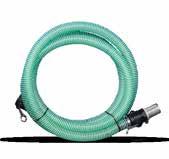

“This is particularly timely and important when we note the huge areas of erosion caused by the cyclones in Northland, Tairawhiti and Hawke’s Bay in January and
“There are potholes even on state highways.”
In a roundup of policy issues Melville said a series of meetings were planned in June on Affordable Water Reforms, which had an even stronger focus on environmental protection than Three Waters which they replaced.
There were also deep concerns expressed about changes to the Resource Management Act (RMA) currently going through Parliament and worries that under present Emission Trading Scheme (ETS) settings there would be a carbon glut by 2030, which could mean the carbon credit price could crash.
There was a need for a growth story around dairy, beef and lamb production which, through using new technologies such as genetically modified ryegrass, could reduce their environmental footprint.
February. That’s why there will be a focus on alternative species to help control erosion.”
Go to https://www.nzffa.org.nz/ events/ to find out where the workshops are being held and to register.
RURAL NEWS // MAY 9, 2023 NEWS 7
GLENYS CHRISTIAN
Fed’s national freshwater spokesman Colin Hurst says the cost of regulations is sucking money out of rural sector.
Changing the minds of bureaucrats
approach is a better way to protect soils close to waterways.

NATIONAL’S NEWLY-MINTED agriculture spokesman Todd McClay says the public services need a change of mindset when it comes to dealing with the primary sector.
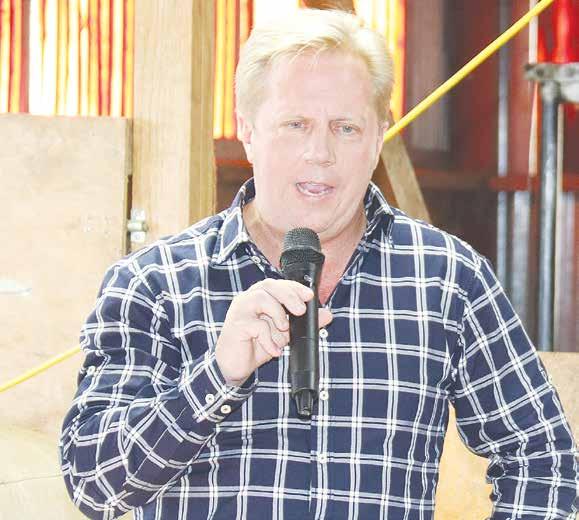
Speaking along with his boss Christopher Luxon at a recent ‘wool-shed’ meeting in Hawke’s Bay, McClay says the public service seems to think that the way to solve a problem in rural areas is to make more rules – regardless of the cost impact of these. He says some of these rules are quite unworkable in a practical sense.
Instead, McClay believes bureaucrats need to understand that fewer and better rules that have less of a financial impact on farmers is the correct solution.
“Take, for example, the winter grazing slope rules,” he told the audience of farmers. “They said the whole country should have a blanket rule with a 10-degree slope rule and you can’t winter your animals there to feed them – unless you pay money to get a resource consent. Well, that’s a mad rule.”
McClay accepts that there is a need to protect the environment and waterways but believes a catchment-by-catchment
The Hawke’s Bay meeting attended by the two local National candidates, Catherine Wedd and Katie Nimon, is clearly part of a strategy by the party to shore up the rural vote, some of which could be siphoned off by ACT.
McClay emphasises that National sees agriculture as one its top priorities. He says, as well strengthening rural economies, it plays a vital role in earning money that provides for other important things –such as health and education. He also put out a call for people to stop unfairly criticising farmers.
“Instead, people should be championing the rural sector, not vilifying it.”
At the meeting, people were keen to hear Christopher Luxon talk not only about farming but other areas of concern to rural communities – such as health and education. His promise to reduce the number of regulations drew applause.
Luxon says his goal is for agriculture to grow by 2% a year and says, if it does, there will be an extra $50 billion in the government coffers by 2050.
“I want people to focus on how we grow this sector more and not burden it with more regulations,” he says.
RURAL NEWS // MAY 9, 2023 8 NEWS
PETER BURKE peterb@ruralnews.co.nz
ARE ON NOW FIELD DAY SPECIALS 6.99% FINANCE P.A+ UP TO $2,500 FREE ACCESSORIES^ 0800 440 290 | www.polarisnewzealand.com | /PolarisNZ | /polarisorv_nz *Offer ends 31/7/23 or while stocks last. Offer only available at participating Polaris Dealers. Not valid with any other offer. Excludes fleet clients. +Finance offer is only available on selected models. GST registered customers only. 24-month term contract. 20% Deposit required. Deposit may include Trade (Trade conditions apply). Fees and conditions apply (normal lending criteria applies) Finance is provided by Polaris Finance, a program operated by De Lage Landen Limited Company No 135515. DON’T MISS OUT, CONTACT YOUR LOCAL POLARIS DEALER TODAY!
National’s agriculture spokesman Toddy McClay says the public services need a change of mindset when it comes to dealing with the primary sector.
Live exports debate not dead yet – Nats
ONE ASPECT of the National Party’s recently announced agricultural policy – re-instating live animal exports – has drawn a mixed reaction.
On the day the policy was announced by National, the ban on live exports by Labour took
200,000 extra calves without live exports, it could mean even lower prices for farmers.”

Hoggard questions claims that live animal exports threaten NZ’s export credentials and says if there were any problems, that would be a reason for putting a ban back in place.
“I think, sometimes
welfare is not political and should not be used as a vote-chasing, political football. She says it’s disappointing to hear that National would consider reinstating livestock exports.
“Irrespective of vessels being purpose built, animals would still be subjected to sea journeys of
up to three weeks and a journey across the equator,” Beattie claims.
“Managing cattle welfare in these circumstances while maintaining an economically viable model would be extremely difficult and for that reason could never be classed as ‘gold standard’.”
effect, with the last ship sailing from New Plymouth.
Federated Farmers president Andrew Hoggard is one of those to come out in of support National’s policy. He thinks it’s a good thing – especially if there is an excellent standard of care on the journey.
Hoggard says from what he’s heard, this is the case and he points out the last disaster, when a ship sank, was by all accounts due to mechanical and human error.
Hoggard says even with live exports it’ll still be hard and frustrating for farmers to dispose of their bobby calves –especially in relation to getting killing space at freezing works. He says there is a risk of lower prices.
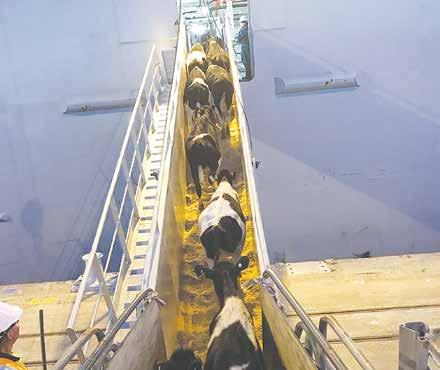
“Suddenly, if we are going to push through
NZ makes up justifications for other countries to put trade barriers against us,” he adds. “We should be championing what we do, not coming up with excuses for other countries to put us down.”
Unhappy about National’s plans is the group Veterinarians for Animal Welfare Aotearoa (VAWA).
While the collective calls itself ‘veterinarians’, it actually includes other non-vets such as animal welfare advocates, animal welfare scientists, and other non-veterinary and body corporate members. Founding members include well-known farming critics – such as former Fish and Game head Bryce Johnson and ecologist Mike Joy.
Group spokesperson and veterinarian Dr Helen Beattie claims animal
FOR NOW, THE DOOR IS SHUT
AGRICULTURE MINISTER Damien O’Connor is unrepentant about the ban, hailing it as putting NZ in step with likeminded partners on the importance of animal welfare.
He says Australia has moved to phase-out the live export of sheep, and animal welfare standards are bedded into our FTAs with the UK and the EU.
“Recent talk of restarting live exports by sea simply ignores the reality that our consumers overseas take issues of sustainability, climate and animal welfare seriously, which is why they’re reflected in our recent FTAs,” he says.
O’Connor says in a market where consumers are becoming more and more discerning about ethical and environmental credentials, his government has moved to ensure that NZ’s reputation for ethical trade is not at risk.
THEY REACH THEIR PEAK POTENTIAL
RURAL NEWS // MAY 9, 2023 NEWS 9
PETER BURKE peterb@ruralnews.co.nz
“Suddenly, if we are going to push through 200,000 extra calves without live exports, it could mean even lower prices for farmers.”
PROUDLY AVAILABLE FROM YOUR LOCAL PARTICIPATING VETERINARY CLINIC Boehringer Ingelheim Animal Health New Zealand Limited. Level 3, 2 Osterley Way, Manukau, Auckland, New Zealand. MARKS-MIN® is a registered trade mark of the Boehringer Ingelheim Group. Registered pursuant to the ACVM Act 1997, No. A011687. See product label for full claim details and directions for use. © Copyright 2021 Boehringer Ingelheim Animal Health New Zealand Limited. All rights reserved. NZ-BOV-007-2021. Ensure young stock become future high producers through improved health, growth and energy at: futureproducers.co.nz The essential building blocks for optimal health including vitamin B 12 in one convenient injection.
National’s plan to re-instate live animal exports has drawn a mixed reaction.
ENSURE
Golden oldie shows no signs of slowing down
Jim Anderson is a third generation farmer still working on the family farm at Southburn, in South Canterbury, alongside his son and grandson. Even at age 85, Anderson shows no signs of slowing down. Leo Argent reports.
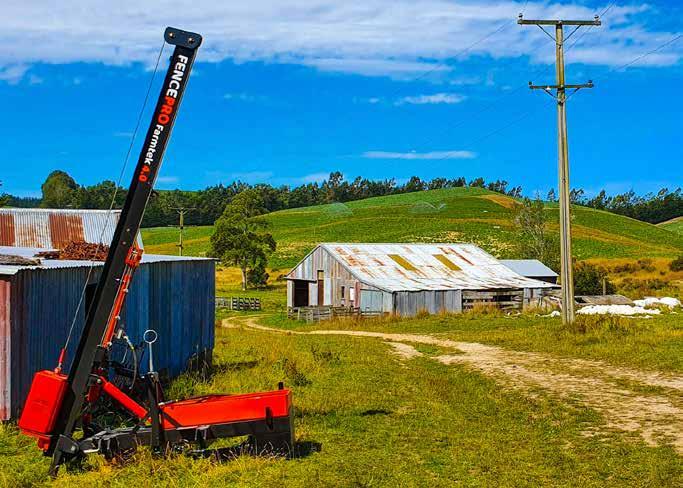

JIM ANDERSON was born in Timaru in 1937 and educated at Timaru and Southburn schools.
Before completing his secondary education via correspondence in 1952, he took up working on the family farm under his father, as well as contract work.
Apart from a nine year management stint at the Claremont Recovery Trust, Anderson has farmed continuously.
Taking over the farm in 1961, he married his wife Mary in 1962 with whom he has 11 children, several of whom work in the rural sector. In 2004, son Miles took over the farm, with Anderson
senior continuing on as a farm hand.
Anderson says that he keeps working because he enjoys it.
“You’re a jack of all trades in farming. I muster, drive tractors, understand bookkeeping,” he told Rural News
“The arable side of farming has always interested me, I’m very keen on looking after the land.”
Additionally, he believes the social and political sides of farming are very important and often overlooked.
“My father’s generation were basic, honest people but very informed about world politics,” he
Go to the Campaign sec�on of our website to see “Put GWP* on COP28 Agenda” - the government are asking for feedback on how they can advocate for New Zealand at the next C�P Mee�ng� We think it’s a great opportunity to have our Climate Minister stand up for NZ and push for the use of GWP*, being a more accurate way of calcula�ng and repor�ng of our emissions� Copy and paste the suggested email and fire it away to them!
says. “One day I asked my father why that was and he said, ‘because everything that happens overseas affects my livelihood.’”
Anderson believes one of the greatest things in his farming life was becoming a member of the Young Farmers Club; sponsored by the Department of Agriculture.

“You received a lot of education, field days, learning about soil science and all those things,” he explains.
“One of our activities was a debating club and I hated it, but looking back it was one of the most marvellous opportunities I ever had.”
Anderson says that he is fortunate to still have good health to perform his duties effectively and encourages others in the industry – boss and employee alike – to con-
sider staying if they do too.
“I still do most of the things I used to, just a bit slower,” he says. “There’s a man near us, Frank Black, who’s 95 and he still drives his heading machine. I have never met a successful farmer that didn’t work hard, but
by the same token you’ve also got to know when it’s time to go.”
Over the years, Anderson has seen many changes in farming.
“In my early memories of farming, horses were the main way of farming, with thrashing mills and steam engines. The
Downlands water was the biggest agricultural water scheme in the southern hemisphere in the ‘40s.

Lots of the things that are happening now seemed like science-fiction, you wonder how much further it can go.”
Anderson considers the advent of electric
fencing and pregnancy scanning as two of the most revolutionary farming advances in his time. The first keeping stock in cheaply and effectively and the second knowing what ewes will be having twins or triplets and thus what to feed and medicines to give them.
However, he admits that not everything is better now, though.
“I think the big problem I have is from an environmental point of view, we’ve become very wasteful.
“We don’t repair anything and we don’t seem to be effectively able to recycle the stuff we can’t replace.”
Speaking to the upcoming generation of farmers, Anderson has one main piece of advice.
“Absorb as much academic education as you can and gain as much physical experience on the farm so when you get to the latter stages of your education,” he says.
“You can relate what’s been taught to you to what you’ve experienced out on the land.”
You can also click on Protect your �read and �u�er to sign our pe��on to Chris �ipkins telling him to put the Farming (emissions) Tax on his policy bonfire!
RURAL NEWS // MAY 9, 2023 10 NEWS
4.0m Farmtek • Side Mount 900 • 4 Function Valve Bank • 190kg Block • Adjustable Feet • Plastic toolbin • Nationwide Special Contact Us | www.fencepro.co.nz | 06 777 5366 *Free delivery to your nearest FENCEPRO dealer FENCEPRO has the largest range of customizable postdrivers in New Zealand - With industry leading components, a short lead time, and local support, you can be sure that you will get everything you need, to get your job done Tough • User-Friendly • Versatile FENCE
Price:
GST Retail Price: $18,150
GST
Jim Anderson and grandson Joseph overseeing the drenching and worming on the family farm at Southburn.
PRO Special
$16,900 +
+
www.groundswellnz.co.nz
FARMERS WERE quick to demand more detail when they got a first look at National’s agriculture policies at a mid-April meeting at Otaua, southwest of Auckland, hours after its announcement.

Firstly, they focused on the Government’s environmental regulations that has a direct, and they fear detrimental, effect on their farming operations.
“At any time, iwi can issue a statement and change their minds,” claimed immediate past-president of Auckland Federated Farmers, Wendy Clark.
Meanwhile, former dairy chair Craig Maxwell wanted to know if National would be getting rid of those statements, concerned at the change from councils needing to take account of the Treaty of Waitangi when it came to consented activities to give effect to it.
Local MP, Andrew Bayly says National will be rewriting the legislation if elected.

“There’s a lot to be undone before we even start talking about how to grow the economy.”
He added, as a general principle, National wouldn’t accept co-governance but says Māori had a role to play.
Bayly had invited local farmers to hear National’s Agriculture spokesman Todd McLay speak but he was busy announcing the party’s agriculture policies.
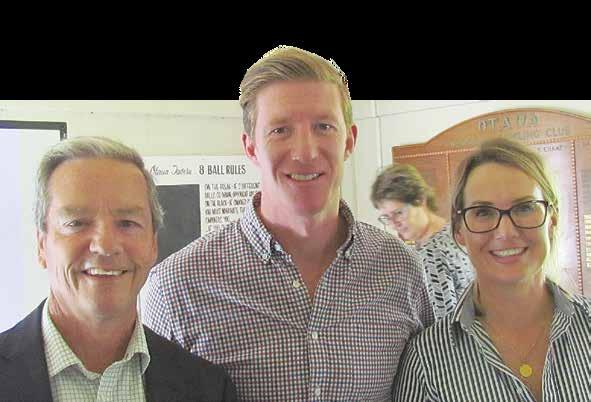
So, Nicola Grigg, associate agriculture spokesperson as well as spokesperson for animal welfare, biosecurity and food safety as well as horticulture spokesperson, and associate science, research and technology spokesperson, Sam Uffindel, came to talk to around 30 farmers.
Grigg claims that under new Resource Management Act (RMA) rules, many farmers wouldn’t be able to farm.




“It’s like Three Waters with so many layers of bureaucracy,” she
explained. “There’s unbelievable stress and complication it’s going to bring.”
Grigg added that there were 20 different pieces of regulatory change under environmental law reform with which farmers were dealing.
“That’s why you feel a tidal wave is coming at you,” she said. “There’s no use in a grey-faced bureaucrat in Wellington thumping away at a keyboard making rules for you.”
Grigg added that despite an extra 14,000 civil servants being employed under the Labour Government, the Ministry for Primary Industries’ (MPI) delivery had “declined significantly”. She believes part of the solution was for its employees to spend one week every year on-farm.
She says she lay awake at night worrying about foot and mouth disease coming into the country, with 1000 travelers a week arriving from Bali since flights started again early in April.
“We’ve got to be stricter.”
Grigg is also nervous about port security.
“Agriculture is what pays our way in the world,” Uffindel told the gathering.
He believes there is an ability to drive a significant increase in value in exports “if we do things more efficiently”. He claims farmers are being increasingly hit by wage demands and rules created by bureaucrats who’d “never set foot on a farm”, wasting farmers’ time.
Farmers at the meeting also expressed frustration about what they saw as inefficient and timewasting reporting systems. Maxwell says he’d spent two hours re-entering the same information for his fertiliser company as was already held by Auckland Council.


Auckland Federated Farmers’ president, Alan Cole, says with Significant Natural Areas (SNA), councils had already had a lot of the mapping work

11
GLENYS CHRISTIAN which was now being carried out again.
www.cfmoto.co.nz The CFMOTO TREK is focused on protection from the elements. Standard accessories include: made in New Zealand (Trax Equipment) automotive grade glass tilt windshield with wiper, CF Connect rear windshield, full door kit, roof kit, heated seats, nerf bars and 3500lb winch. 800cc V-twin, 62hp Power steer 500kg tow capacity 200kg rear tray capacity 3500lb winch Available in Titanium Grey 580cc engine, 41hp Two drive modes Hill descent control Power steer LSD - rear limited slip differential 3500lb winch 680kg tow capacity 250kg rear tray capacity Available in Titanium Grey 963cc V-twin, 71hp Two drive modes Power steer LSD – Rear limited slip differential 800kg tow capacity 350kg rear tray capacity Available in Twilight Blue UFORCE RANGE CFORCE RANGE $19,490 EX GST $13,990 EX GST $14,990 SAVE $1000 $15,490 EX GST NOW NORTH ISLAND SOUTH ISLAND Andys Moto Services, Waiuku (027) 944 5442 Brown Brothers Bikes, Whanganui (027) 572 7696 Country Engineering, Tauranga (07) 552 0071 Country Machinery, Sanson (06) 329 3900 Darryl August Motorcycles, Taupo (07) 378 8342 DP Williams, Gisborne (06) 863 2612 Dr Moto, Tauranga (07) 578 9902 Gatmans Mowers, Silverdale (09) 426 5612 Hamilton Motorcycle Centre, Hamilton (07) 849 1919 JC Motorcycles, Waitara (06) 754 6420 Johnston’s, Inglewood (06) 927 3566 Action Sports Direct, Wanaka (07) 928 8045 Ag & Auto Direct, Balclutha (03) 418 0555 Colin Clyne Motorcycles, Oamaru (03) 437 0559 Dan’s Motor Centre, Geraldine (03) 693 8536 Diesel Tech Machinery, Frenside (03) 313 6465 Diesel Tech Machinery, Methven (03) 302 8946 Franks Motorcycles. Mataura (03) 203 7309 Ian Day Farm and Lifestyle, Alexandra (03) 448 9007 Marlborough Motorcycles, Blenheim (03) 579 2500 Nelson Motorcycles, Nelson (03) 548 3786 Remarkable Motorcycles, Queenstown (03) 441 4653 Maungaturoto Motorcycles, Maungaturoto (09) 431 8555 Motorcycle HQ, Pahiatua (06) 376 7163 Northland Powersports, Whangarei (09) 437 5451 NZ Motorcycle Importers, Upper Hutt 02108 289 789 Outdoor Power, Hastings (06) 878 2369 Peninsula Motorcycles, Thames (07) 868 6104 RevTech Powersports, Stratford (06) 765 7712 Rob Titter Farm Services, Kaikohe (09) 401 1774 Rouse Motorcycles, Hikurangi (09) 4338 471 Tahuna Motorcycles & Atvs, Tahuna 02102 489 407 *Save $1000 applies to UFORCE 800 EPS. Offer expires 31st May 2023 and/or while stock lasts. Ride away prices quoted exclude GST. See www.cfmoto.co.nz for more information. 400cc engine, 30hp Selectable 4WD Steel wheels Steel carrier racks Available in Sky Blue 400cc engine, 30hp Selectable 4WD Power steer Alloy wheels 2500lb winch Available in Lava Orange 495cc engine, 34hp Power steer LED headlights Alloy wheels 2500lb winch 5-inch display Available in Force Red 580cc engine, 40hp Power steer Front and rear diff lock All 4 wheel disc brakes Alloy wheels 2500lb winch Available in Titanium Grey NEW NEW NEW $7,990 EX GST $8,990 $9,990 EX GST EX GST $11,990 EX GST KEEP MOTHER NATURE AT BAY $24,490 EX GST 963cc V-twin, 71hp Long wheelbase / 6 seater Two drive modes 800kg tow capacity 350kg rear tray capacity Available in Twilight Blue $24,490 EX GST NEW *Overseas model shown. Farmers keen for details
National’s Andrew Bayley, Sam Uffindel and Nicola Grigg spruiking the party’s new ag policy at a farmer meeting in South Auckland.
Giving back to the rural sector
THE CARR Family Foundation was keen to help the rural communities that have supported its business journey over the last 40 years.
Last year, the owners of the agribusiness Carrfields Group created a Rural Health and Wellness Initiative. Chairperson Stacey McKerchar says the Foundation is a 100% charitable trust that will fund this initiative from allocations contributed annually from the parent company. She says the main objective is to ensure that rural communities have access to mental and physical health checks and rural people have the chance to get a personal ‘warrant of fitness’.
“We recognised that many of our loyal cus-
tomers are often fighting mental health issues brought about by isolation or the relentless nature of modern farming or having difficulty accessing good health advice,” McKerchar explains.
“Because of long lead times to see doctors, or the inability to get offfarm for several hours, we figured that part of their routines often revolved around auctions or on-farm sales and thought, if that’s the case, let’s take healthcare to those locations.”
This resulted in the Carr Family Foundation commissioning a purpose-built bus that travels the country. It is manned by nurses who can carry out a general holistic check-up – covering areas such as blood pressure, cholesterol levels, weight and body mass index-
ing – then dispensing solid advice on any health issues.
“Our nurses are also on hand to look out for any signs of mental health or anxiety issues,” McKerchar adds. “Of course, if anything is untoward, they can help make doctor or medical professional appoint-
ments and – if needed – call the emergency services.”


Setting up in places such as stockyards, clearing sales or any other rural events, the initiative seeks requests from the likes of The Rural Support Trust – or even Carrfields Group agents working in the field.

In 2022, the minibus set up as far south as Gore, then headed north taking in several locations – including Mosgiel and North Canterbury.
During 2023, locations have so far included Masterton, Fielding and Te Kuiti, with the recently devastated East Cape region on the “hit list”
for later in the year.
Another key part of the initiative is the ambassadorial and logistics role by Ashburtonbased, Craig “Wiggy” Wiggins. He describes his involvement as a ‘great fit’ for the work he already does around rural mental health with his ‘Whatever with Wiggy’ charity that facilitates mental health support throughout NZ.
“We turn up at stockyards and see everyone who shows up, including the yard staff, auctioneers and stock agents, typically seeing 40 to 50 people every day,” Wiggins explains. “People receive a report card to take to their own GP for further follow up if required.”
He says with many rural people often living in an isolated community, many people have
avoided doctor’s visits –with some even admitting 30 years between visits.
“We just want to make it easy for them to get a quick check-up and have some peace of mind, then maybe go back to their communities and start a conversation about regular health checks.”
Wiggins knows he will be busy at the events but believes his role at the sale yards is straightforward.
“I’ll break the ice, have a chat with passers-by, and then offer a quick health check.”

McKerchar says in any community or business, people are always the greatest asset.
“So, we are happy to facilitate much-needed health advice and give a little back to those people who have supported our businesses over the last four decades.”

CORRECT YOUR CALCIUM MAGNESIUM
with Golden Bay Dolomite for a healthier system
Dryland cropping farmer Tom Rudge farms on the fertile mid-Canterbury plains between Rakaia and Methven. There are two predominant soil types on the property, a well-draining deep Templeton silt loam and a Lismore shallow silt loam. Nestled between the foothills of Mount Hutt and the coast, the annual temperature is 9.2 degrees with an annual rainfall of 967mm. The area experiences dramatic extremities with short, cold winters and occasional snowfall, switching to drought-prone conditions in the early summer months.
Tom specialises in an intensive crop rotation that consists of consecutive cereal crops, wheat, and barley, followed by a grass fallow period before returning to the cereal rotation, a cycle that is reliant on high nutrient inputs. Seven years ago, Tom become frustrated with their traditional NPKS approach as they were seeing the same issues paired with underperforming crop yields year-on-year.
Production was suffering in key areas:
The turning point came after Tom attended Neal Kinsey’s introductory soils course, summarising American scientist William Albrecht’s work. This was revolutionary as it not only focused on the volume of different elements present in the soil profile, but the relationship between them. The research resonated with Tom’s willingness to try an alternative soil science, and they haven’t looked back. Over the seven years since switching approaches, they have observed:
1.
Seeds establish a




RURAL NEWS // MAY 9, 2023 12 NEWS
markd@ruralnews.co.nz
MARK DANIEL
The main objective of Carrfields Rural Health and Wellness Initiative is to ensure that rural communities have access to mental and physical health checks.
Learn how Tom lessened the pests and diseases plaguing his farm.
03 525 9843 | sales@goldenbaydolomite.co.nz | www.goldenbaydolomite.co.nz To find out more about the benefits of balancing your soil elements contact GBD on SCAN HERE
GBD Advertorial
Crops were failing to establish quickly with strong growth High prevalence of pest and disease burdens Trace element deficiency correction had minimal improvement
strong root
early
pressure
With these results, Tom “wouldn’t hesitate to recommend switching to Golden Bay Dolomite for other farmers to improve their crop health and production. GBD is easy to engage with, and there have been no problems ordering GBD products or delivery timeframes. Incorporating GBD into our cropping program is seamless and it goes on paddocks without any issues.” wet downpours
system
2. Seedlings experience less disease/pest
3. Greater resistance to extremities like summer dry or


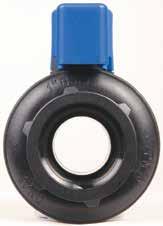



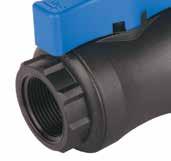







The Hansen Full Flow Ball Valve’s reputation for holding up in frosty weather is quite simply unsurpassed! The extraordinarily high quality design coupled with a host of practical features makes it the ultimate user experience. What’s more it’s the only NZ made Ball Valve with a 100% replacement warranty. High Pressure Rated Full Flow Bore 16bar (235psi) True Full Flow Bore 25mm Ball Valve = 25mm Bore
or
Flow
www.hansenproducts.co.nz
Frost Friendly Valve!
Smooth Open/Close & Removable Handles Male/Female
Female Thread Options HAND TESTED Frost Friendly Full
Ball Valves Full Flow Ball
New red meat campaign dots down
A NEW campaign from Beef + Lamb New Zealand Inc. seeks to highlight the link between life’s memorable moments and New Zealand red meat.
The “Good things start with New Zealand beef and lamb” campaign kicked off last month with TV spots featuring women’s rugby player Stacey Waaka.

In the same vein as previous campaigns, which featured Kiwi athletes like the EversSwindell twins, Lisa Carrington and Sophie Pascoe, the campaign highlights the link between sport and New Zealand red meat.
However, it’s more than that, says Beef + Lamb New Zealand Inc. chief executive Kit Arkwright.
“First and foremost,
the campaign is a celebration of the product,” he told Rural News just days after the launch.


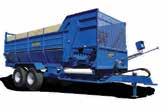
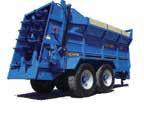




“It’s about that link between life’s memorable moments and New Zealand beef and lamb.”
Arkwright says the campaign targets all New Zealanders, pointing to a 2022 survey, which found that 92.8% of Kiwi adults ate red meat at least once a week.
Arkwright says that Waaka is the perfect fit for the campaign after her memorable try in the Women’s Rugby World Cup final last year.
“Seeing her score her try in that remarkable final, it was clear how much passion and enjoyment she has for representing her country.
I don’t think there is a better analogy for how our farmers, butchers and chefs feel about showcasing what makes New Zea-
land beef and lamb the best in the world.”
He adds that there is never not a good time to reiterate the messaging around the health benefits of red meat.
Arkwright says that while cost is particularly relevant amid the current cost-of-living crisis, it’s important to remember the nutritional value of New Zealand beef and lamb. According to the latest data from Stats NZ, food prices rose 12% for the average household in the past 12 months, with meat, poultry, and fish up 7.8% since March 2022.
“Beef and lamb can be expensive and challenging to afford for some Kiwi families at the moment,” he concedes.
“But I think it’s important to remember the nutritional value red meat has.”
Arkwright says that beef and lamb are one of
a range of options available to Kiwis in 2023.
“There are lots of alternatives, but those alternatives are not
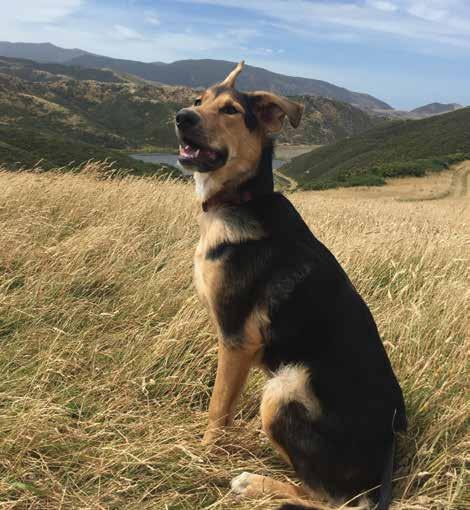

always like for like nutritionally,” he adds.
Arkwright points particularly to plant-based options marketed as
‘meat alternatives’, saying consumers shouldn’t think they are getting the same nutrition out of those alternatives that
they would get from beef and/or lamb.
“It’s like almond milk and cow’s milk, they’re not like for like.”
RURAL NEWS // MAY 9, 2023 14 AGRIBUSINESS
JESSICA MARSHALL jessica@ruralnews.co.nz
PHONE: 0800 622 276 WWW.MCINTOSH.KIWI STRENGTH / QUALITY / PERFORMANCE Sponsored holes, great prizes, BBQs, and afternoon tea All for just $25 Register 10am Shotgun start 10:30am AnnuAl fArmers Golf tournAment tuesdAy 23rd mAy rAnGitikei Golf Club rAumAi roAd, bulls leAve the doG in ChArGe...muCh more fun off thefArm! enquiries: Geoff Ingram 027 323 1277 Kevin Taylor 027 440 2721 Bruce Kinloch 027 243 0050
Women’s Rugby World Cup final try scorer Stacey Waaka is the star of the latest Beef+Lamb red meat promotional campaign.
Passion for rural NZ key to Farmlands Board success
Passion for rural NZ key to Farmlands Board success
Passion for rural NZ key to Farmlands Board success Y
ou don’t have to be perfect; you should be passionate about contributing to the future success of rural New Zealand is the message from Dr Warren Parker as Farmlands board elections approach.
YYou don’t have to be perfect, but you should be passionate about contributing to the future success of rural New Zealand –that’s the message from Dr Warren Parker as Farmlands board elections approach.

ou don’t have to be perfect, but you should be passionate about contributing to the future success of rural New Zealand –that’s the message from Dr Warren Parker as Farmlands board elections approach.
Warren has brought his passion for and belief in the role the rural supplies co-op plays to his five and half years serving as a shareholderelected board member.
Warren has brought his passion for and belief in the role the rural supplies co-op plays to his five and half years serving as a shareholder-elected board member.
Warren has brought his passion for and belief in the role the rural supplies co-op plays to his five and half years serving as a shareholderelected board member.
“I‘ve had the opportunity and privilege to contribute to the development of the co-op over this period and support the growth of Aotearoa’s agriculture and horticulture sectors,” says Warren.
“I‘ve had the opportunity and privilege to contribute to the development of the co-op over this period and support the growth of Aotearoa’s agriculture and horticulture sectors,” says Warren.
“I’ve had the opportunity and privilege to contribute to the development of the co-op over this period and support the growth of Aotearoa’s agriculture and horticulture sectors,” says Warren. “It’s time for me to hand the baton to a new director with fresh ideas on how Farmlands can continue to move forward.
“It’s time for me to hand the baton to a new director with fresh ideas on how Farmlands can continue to move forward. I hope to see some high calibre candidates, with diverse backgrounds and strong connections to our industry, put themselves forward – whether farm owners, managers or rural experts.”
“It’s time for me to hand the baton to a new director with fresh ideas on how Farmlands can continue to move forward. I hope to see some high calibre candidates, with diverse backgrounds and strong connections to our industry, put themselves forward – whether farm owners, managers or rural experts.”
I hope to see some high calibre candidates, with diverse backgrounds and strong connections to our industry, put themselves forward – whether farm owners, managers or rural experts.”
Farmers and growers are wrestling with some significant economic, market and environmental challenges right now, adds Warren.
This means directors with backgrounds in or knowledge of emergent sectors like horticulture, Māori agribusiness and integrated land use could bring value to the board. Equally, breadth of experience and different perspectives from our core pastoral farming sectors such as dairy, or sheep and beef cattle farming are always valuable.
Farmers and growers are wrestling with some significant economic, market and environmental challenges right now, adds Warren. This means directors with backgrounds in or knowledge of emergent sectors like horticulture, Māori agribusiness and integrated land use could bring value to the board. Equally, breadth of experience and different perspectives from our core pastoral farming sectors such as dairy, or sheep and beef cattle farming are always valuable.
Farmers and growers are wrestling with some significant economic, market and environmental challenges right now, adds Warren. This means directors with backgrounds in or knowledge of emergent sectors like horticulture, Māori agribusiness and integrated land use could bring value to the board. Equally, breadth of experience and different perspectives from our core pastoral farming sectors such as dairy, or sheep and beef cattle farming are always valuable.
It’s an exciting time to be part of the co-op – with its clear strategy of supporting on-farm profitability by being the strongest buying group it can be.
It’s an exciting time to be part of the co-op – with its clear strategy of supporting on-farm profitability by being the strongest buying group it can be.
Warren says, “We’re being true to the foundations of why Farmlands was founded, as I personally understand well with my Hawke’s Bay-based father-in-law being an early member and enthusiastic supporter.
Warren says, “We’re being true to the foundations of why Farmlands was founded, as I personally understand well with my Hawke’s Bay-based father-in-law being an early member and enthusiastic supporter.
It’s an exciting time to be part of the co-op – with its clear strategy of supporting on-farm profitability by being the strongest buying group it can be.
Warren says, “We’re being true to the foundations of why Farmlands was founded, as I personally understand well with my Hawkes Bay-based father-inlaw being an early member and enthusiastic supporter.
“Our challenge, like that for our forebears, is to continue to be more innovative and quicker to adapt than others in order to deliver on our role, as the world has changed and will continue to.”
“Our challenge, like that for our forebears, is to continue to be more innovative and quicker to adapt than others in order to deliver on our role, as the world has changed and will continue to.”
Our challenge, like that for our forebears, is to continue to be more innovative and quicker to adapt than others in order to deliver on our role, as the world has changed and will continue to.”
Warren is leaving the co-op in a stronger position than he joined it –with some huge change programmes now in the rear-vision mirror. These include establishing the co-op’s nationwide IT infrastructure for the future, reshaping the organisational structure, updating the constitution, and setting a strong financial base – as demonstrated by last year’s shareholder distribution.
Warren is leaving the co-op in a stronger position than he joined it –with some huge change programmes now in the rear-vision mirror. These include establishing the co-op’s nationwide IT infrastructure for the future, reshaping the organisational structure, updating the constitution, and setting a strong financial base – as demonstrated by last year’s shareholder distribution.
Warren is leaving the co-op in a stronger position than he joined it – with some huge change programmes now in rear vision mirror.
Farmlands is now well down the track of leveraging this hard work, with the benefits set to be realised in future years as it executes its enhanced procurement and supply chain management strategy – truly delivering what its customers and shareholders need in the most effective and efficient way.
tors to stamp their mark,” says Warren.
contribution to the Farmlands board.


These include establishing the co-op’s nationwide, IT infrastructure for the future, reshaping the organisational structure, updating the constitution, and setting a strong financial base –as demonstrated by last year’s shareholder distribution.
Farmlands is now well down the track of leveraging this hard work, with the benefits set to be realised in future years as it executes its enhanced procurement and supply chain management strategy – truly delivering what its customers and shareholders need in the most effective and efficient way.
“I have confidence in the future of Farmlands and, while there is always more to do, I’m pleased with where it’s now positioned. I’m also sure that there is a great opportunity for incoming directors to stamp their mark,” says Warren.
“I have confidence in the future of Farmlands and, while there is always more to do, I’m pleased with where it’s now positioned. I’m also sure that there is a great opportunity for incoming directors to stamp their mark,” says Warren.
Farmlands is now well down the track of leveraging this hard work – with the benefits set to be realised in future years as it executes it’s enhanced procurement and supply chain management strategy - truly delivering what its customers and shareholders need in the most effective and efficient way.
As a former educator, Warren would be pleased to see rural sector governance experts who have been part of some of the governance development programmes Farmlands is directly involved in putting themselves forward.
As a former educator, Warren would be pleased to see rural sector governance experts who have been part of some of the governance development programmes Farmlands is directly involved in putting themselves forward.
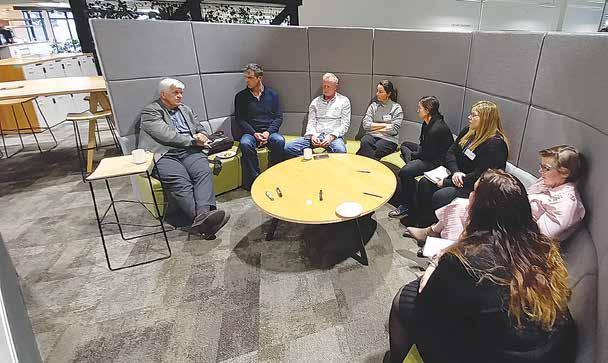
Farmlands works to grow potential
Farmlands works to grow potential

“I have confidence in the future of Farmlands and, while there is always more to do, I’m pleased with where it’s now positioned. I’m also sure that there is a great opportunity for incoming direc-
future directors through programmes like “To The Core” and its own Board Observer programme.
future directors through programmes like “To The Core” and its own Board Observer programme.
As a former educator Warren would be pleased to see rural sector Governance experts who have been part of some of the governance development programmes Farmlands are directly involved in put themselves forward. Farmlands works to grow potential future directors through programmes like ‘To The Core’ and its own board observer programme.
Warren is retiring from the Farmlands Board to enjoy more of the good life in Rotorua and fulfil other governance roles. During his long career as a scientist, teacher, leader and adviser, he has been deeply involved in governance of technology-related ventures and in agri-education, all of which laid solid groundwork for his contribution to the Farmlands board.
Warren is retiring from the Farmlands Board to enjoy more of the good life in Rotorua and fulfil other governance roles. During his long career as a scientist, teacher, leader and adviser, he has been deeply involved in governance of technology-related ventures and in agri-education, all of which laid solid groundwork for his contribution to the Farmlands board.
Farmlands chair, Rob Hewett says, “I’d like to personally thank Warren for all his insight and expertise that he has offered up to Farmlands over his period on the board. It’s been a pleasure to work with him on the Farmlands board in support of Kiwi farmers and growers.”
he has offered up to Farmlands over his period on the board. It’s been a pleasure to work with him on the Farmlands board in support of Kiwi farmers and growers.”
he has offered up to Farmlands over his period on the board. It’s been a pleasure to work with him on the Farmlands board in support of Kiwi farmers and growers.”
Farmlands chair Rob Hewett says, “I’d like to personally thank Warren for all his insight and expertise that
Farmlands chair Rob Hewett says, “I’d like to personally thank Warren for all his insight and expertise that
Warren is retiring from the Farmlands board to enjoy more of the good life in Rotorua and fulfil other governance roles. During his long career as a scientist, teacher, leader and advisor, he has been deeply involved in governance of technology-related ventures and in agri-education, all of which laid solid groundwork for his
Shareholders wanting to learn more about becoming a Farmlands Shareholder Director can take a look here (XXXLINK TO WEBPAGES XX). You can request a nomination pack by calling the election helpline on 0800 666 047 or emailing iro@ electionz.com.
Shareholders wanting to learn more about becoming a Farmlands
Shareholder Director can take a look here (XXXLINK TO WEBPAGES XX). You can request a nomination pack by calling the election helpline on 0800 666 047 or emailing iro@ electionz.com.
Nominations close at 5pm on Monday 12 June 2023. Voting packs will be sent by email once the nominees are confirmed.
Nominations close at 5pm on Monday 12 June 2023. Voting packs will be sent by email once the nominees are confirmed.
Shareholders wanting to learn more about becoming a Farmlands shareholder director can take a look here (www. farmlands.co.nz/directorelections2023). You can request a nomination pack by calling the election helpline on 0800 666 047 or emailing iro@electionz. com. Nominations close at 5pm on Tuesday 6 June 2023. Voting packs will be sent by email once the nominees are confirmed.
“I have confidence in the future of Farmlands and, while there is always more to do, I’m pleased with where it’s now positioned. I’m also sure that there is a great opportunity for incoming directors to stamp their mark.”
“I have confidence in the future of Farmlands and, while there is always more to do, I’m pleased with where it’s now positioned. I’m also sure that there is a great opportunity for incoming Directors to stamp their mark.”
“I have confidence in the future of Farmlands there is always more to do, I’m pleased with where it’s now positioned. I’m also sure that there is a great opportunity for incoming Directors to stamp their mark.”
“I have confidence in the future of Farmlands and, while there is always more to do, I’m pleased with where it’s now positioned. I’m also sure that there is a great opportunity for incoming Directors to stamp their mark.”
“I have confidence in the future of and, there is always more to pleased with where it’s now positioned. I’m also sure that there is a great opportunity for incoming Directors to stamp their mark.”
– WARREN PARKER


WARREN PARKER
WARREN PARKER
WARREN PARKER
WARREN PARKER
ADVERTORIAL
Dr Warren Parker speaks to To The Core governance programme participants.
CAPTION CAPTION CAPTION CAPTION CAPTION CAPTION CAPTION CAPTION CAPTION CAPTION CAPTION CAPTION CAPTION CAPTION CAPTION CAPTION CAPTION CAPTION CAPTION CAPTIO
FAR_10899_Director-Election-2023_Advertorial.indd 1 2/05/2023 2:14:32 PM farmlands.co.nz
CAPTION CAPTION CAPTION CAPTION CAPTION CAPTION CAPTION CAPTION CAPTION CAPTION CAPTION CAPTION CAPTION CAPTION CAPTION CAPTION CAPTION CAPTION CAPTION CAPTIO
FAR_10899_Director-Election-2023_Advertorial.indd 1 2/05/2023 2:14:32 PM
Certainty needed!
FARMERS AND growers in Hawke’s Bay are rightly angry and frustrated at the lack of action from Wellington in sorting out a recovery plan for them.
The phrase ‘fiddling while Rome burns’ comes to mind.
The bureaucrats in the capital will argue it takes time to get a plan sorted that is fair for Hawke’s Bay and other areas devastated by Cyclone Gabrielle and other weather events. No one doubts the complexity of this, but the destruction happened two months ago.
Those in Wellington go home each night to a house, something many Hawke’s Bay people no longer have. The Wellingtonians have a job and a future, unlike growers and orchardists in the Bay – many of whom face years of indebtedness.
No bureaucracy is designed for speed. However, it’s time they got up to speed and broke new ground.
The devastation in Hawke’s Bay and along the East Coast is mind-boggling. It’s almost bizarre to see a huge shipping container standing upright in an orchard, hectares of silt and shattered homes and business premises reduced to matchwood.
The damage may look terrible, but what about people’s lives, their future, their mental health and their children? We see signs of things being ‘drip fed’ to people. Can’t the pen pushers see this just adds to the stress and creates more uncertainty?
While the Government did a good, quick, early response by providing some cash for the clean-up, the promise of more help seems to be on the back burner. It appears that everything is being done behind the scenes and the communication from all those involved in supposedly sorting this out has been poor.
Many people badly affected are annoyed that their plight is going unnoticed and they feel abandoned – even by some of their own industry organisations. ‘Why aren’t we on the news?’ they complain.
The claim by Hawke’s Bay orchardists that there is a lack of leadership in the recovery operation is on the money. There is none! Grant Robertson seems to have disappeared. Has anyone heard anything publicly from the CEO of the Cyclone Recovery and do they know who she is?
What the people of Hawke’s Bay and other areas want is not a bundle of long-winded, incomprehensible reports, but a one-page plan of what’s going to be done and a bundle of cash – the opposite of what they are getting now.
RURALNEWS
TO ALL FARMERS, FOR ALL FARMERS
HEAD OFFICE POSTAL ADDRESS: PO Box 331100, Takapuna, Auckland 0740 Phone 09-307 0399

PUBLISHER: Brian Hight Ph 09 307 0399
GENERAL MANAGER: Adam Fricker Ph 021-842 226
CONSULTING EDITOR: David Anderson Ph 09 307 0399 davida@ruralnews.co.nz

“See, I told you the flood waters weren’t too deep to drive through!”
THE HOUND
Dreaming!
A mate of the Hound’s reckons Westpac agri economist Nathan Penny is dreaming with his latest reckons about on-farm inflation. Penny claims current on-farm inflation is now sitting at around 13% – down from 15% at the end of last year. However, this old mutt’s mate is not sure what Penny has been smoking, because the Westpac man reckons on-farm inflation will be down to 4% by the end of this year and down to 2% by the end of 2024. The Hound’s mate suggests Penny needs to get out of Westpac’s ivory tower on Auckland’s Queen street and out on the farm more often. He reckons Penny would then find that the chances of on-farm costs falling to 4% by Christmas this year are about as likely as Westpac offering 3% mortgage rates at the same time!
Bought off?
There has been a lot of public scepticism and controversy about the Government’s $55 million-odd Public Interest Journalism Fund (PIJF), which has seen various media outlets take this funding on certain conditions about how they report or not report on issues. The final tranche of the PIJF was recently announced and this old mutt was surprised to find that a certain weakly (sic) farming publication has stuck its nose into the taxpayer trough and secured around $90,000 in Government funding. It’s a fair bet this publication’s on-going proGovernment stance on things like on-farm emissions taxes paid off in it gaining this handout. However, your canine crusader reckons it would be advisable for readers to take what this publication reports in regard to Government policies – especially with an election approaching – with a large grain of salt!
PRODUCTION: Dave Ferguson Ph 027 272 5372 davef@ruralnews.co.nz
Becky Williams Ph 021 100 4381 beckyw@ruralnews.co.nz
REPORTERS: Sudesh Kissun Ph 021 963 177 sudeshk@ruralnews.co.nz

Peter Burke Ph 021 224 2184 peterb@ruralnews.co.nz
MACHINERY EDITOR: Mark Daniel Ph 021 906 723 markd@ruralnews.co.nz
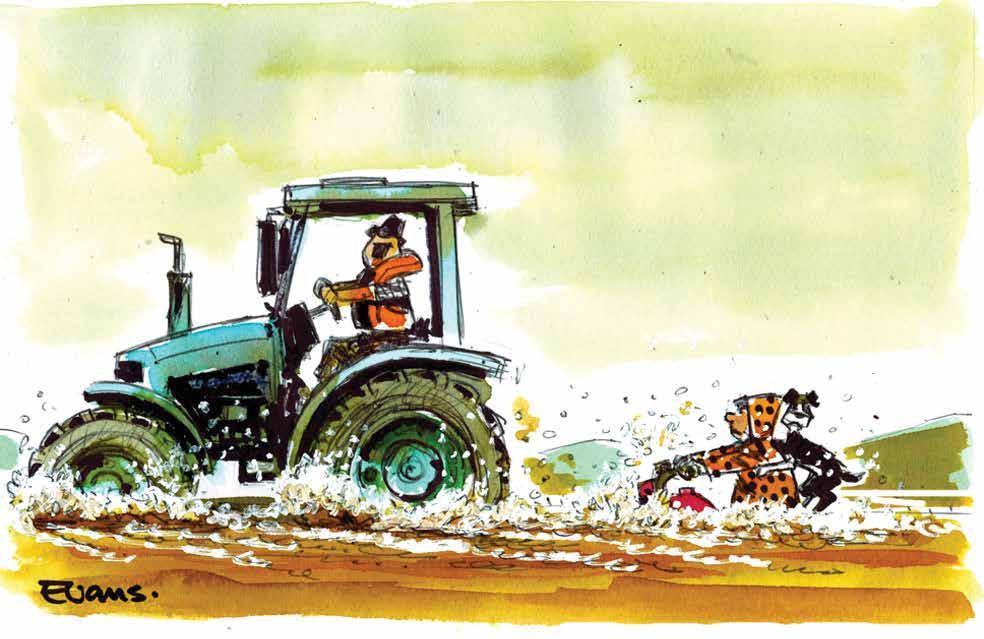
Wrong again!
Remember when the oncecrumbling Westland Milk Products company was bought out by Chinese company Yili in 2019 and the howls of outrage and derision from current Minister of Agriculture and West Coast MP Damian O’Connor describing it as a ‘sad day’ for the West Coast?
However, some four years down the track, Westland Milk – under Yili’s ownership – has gone from strength to strength. Not only is the company paying its farmers a 10c premium above Fonterra’s payout, but last year it also surpassed $1 billion in annual revenue for the first time – making a profit of $39 million, with West Coast farmers receiving a record $9.40/ kgMS for their milk in 2022. Now the company is going to is to invest $70 million to expand its manufacturing of dairy protein lactoferrin. The Hound reckons it looks like O’Connor has added to his long list of wrong calls when it comes to the NZ ag sector!
AUCKLAND SALES REPRESENTATIVE: Stephen Pollard Ph 021 963 166 stephenp@ruralnews.co.nz
WAIKATO SALES REPRESENTATIVE: Lisa Wise Ph 027 369 9218 lisaw@ruralnews.co.nz
PRINTED BY INKWISE DISTRIBUTED BY REACHMEDIA
Expensive pet food!
Your canine crusader was staggered to learn that an investigation by the Taxpayers’ Union has revealed that taxpayers and Otago ratepayers have forked out more than $2.76 million to kill just… 18 wallabies! That’s a kill cost of $153,000 per wallaby and it’s taken 26,000 hours of work.
An OIA by the Taxpayers Union revealed this was just one of the ‘Jobs for Nature’ projects funded by the Government’s Covid slush fund. Labour dreamt up the ‘Jobs for Nature’ scheme – and allocated it $1.2 billion in funding – as a ‘make work’ programme when it feared NZ would see mass job losses as a result of the pandemic. According to the Taxpayers Union, ‘Jobs for Nature’ has continued to dish out taxpayer money to ineffective ‘conservation’ projects at an average cost of around $200,000 per ‘job’. No wonder the country is facing massive fiscal problems when the Government develops silly ideas like this!
WELLINGTON SALES REPRESENTATIVE: Ron Mackay Ph 021 453 914 ronm@ruralnews.co.nz
SOUTH ISLAND SALES REPRESENTATIVE: Kaye Sutherland Ph 021 221 1994 kayes@ruralnews.co.nz
DIGITAL STRATEGIST: Jessica Marshall Ph 021 0232 6446
RURAL NEWS // MAY 9, 2023 16 OPINION EDITORIAL EDNA
Want to share your opinion or gossip with the Hound? Send your emails to: hound@ruralnews.co.nz
Rural News is published by Rural News Group Ltd. All editorial copy and photographs are subject to copyright and may not be reproduced without prior written permission of the publisher. Opinions or comments expressed within this publication are not necessarily those of staff, management or directors of Rural News Group Ltd.
Farm emissions bottom lines
IT’S THE business end of the season when it comes to emissions pricing discussions.
The Government is due to announce a final decision in the next few weeks. This is a big moment for our sector and farmers are understandably wanting to know what Federated Farmers’ position is. New Zealand is already worldleading in greenhouse gas efficiency for meat and milk production. Global warming is worsened if a tax forces a production drop here.
We have been clear and consistent since 2019 about what we stand for and we have three firm bottom lines that we won’t budge on.
Firstly, we won’t support emissions pricing until there has been a review of the current methane reduction targets that takes the different warming impact of methane into account.
Our current methane targets are unrealistic, unscientific and go further than is needed to stop farming’s contribution to warming. We are never going to support a 10% 2030 target that drives a 20% reduction in sheep and beef and a 5% reduction in dairy, while plastering our countryside in pine trees and hollowing out rural communities.
Secondly, we will only support pricing for the purpose of incentivis-

ing the uptake of viable mitigation options. Anything else is just a tax on a productive sector, which doesn’t have options.
Because NZ farmers are already the world’s most emissions efficient producers of milk and meat, we are going to need new tools and tech nology to support further reductions. As it currently stands, we don’t have any tools that can be adopted at scale. Frustratingly, the few options we may have, like feed inhibitors and genetically modified rye grass, are being held up by a lack of regulatory pathways.
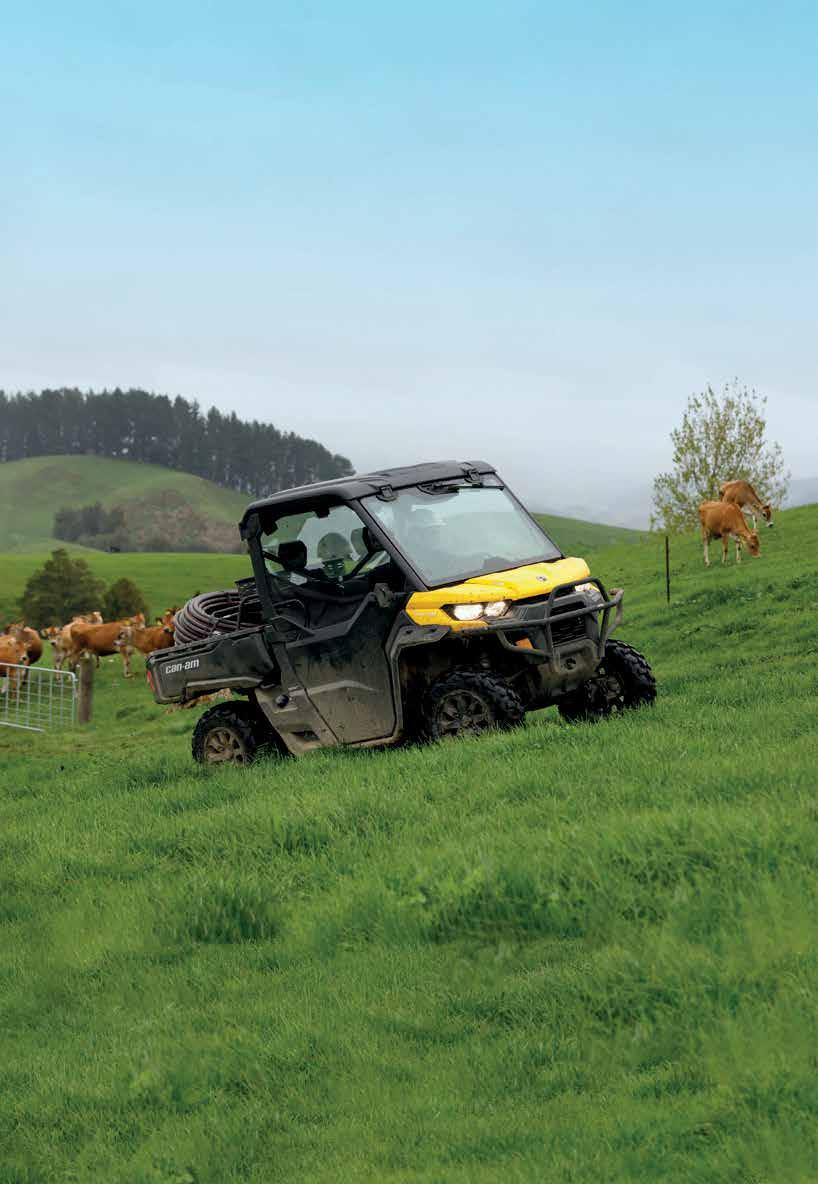
Finally, we won’t sup port emission pricing if it’s just going to lead to what is called ‘emissions leakage’.
It makes absolutely no sense to reduce our pro duction here, only for the gap in the market to be filled by a less emis sion efficient producer. That will just ruin our economy while increasing global emissions.
New Zealand should be in the business of exporting food and fibre, not jobs, market share and emissions.
Farmers can have con fidence that Fed’s will stick firmly to these bottom lines and won’t accept anything that doesn’t meet them. The Government needs to step back and realise that the world has continued to spin for the last few years, and we are now living in a very different environment.
Now is not the time to pull the handbrake on our productive sector. Individual farmers and companies are innovating at a
sumer preferences and market demands change, so will our farmers.
• Andrew Hoggard is national president of


RURAL NEWS // MAY 9, 2023 OPINION 17
ANDREW HOGGARD
RURALNEWS soleniet quiatibu. soleniet quiatibu. PAGE 23 TO ALL FARMERS, FOR ALL FARMERS Read us until the cows come home! www.ruralnews.co.nz READING THE PAPER ONLINE HAS NEVER BEEN EASIER ❱❱ Breaking news ❱❱ Management ❱❱ Animal health ❱❱ Agribusiness ❱❱ Machinery & Products reviews ❱❱ Competitions... and much more
Dear John, what’s the story?
AS SOON as the ‘pen hit the paper’ this column quickly morphed into a ‘Dear John letter’.
So, I will make it clear from the outset; I am sorry John. I do not understand. I read that you are tasked with the job, on behalf of the Ministry for Primary Industries (MPI), to establish a 90 strong ‘On Farm Support Team’.
The picture comes immediately to mind of 90 white knights in full armour racing to the mercy of the poor beleaguered farmer – panting – ‘How can we help? How can we help?’





I can understand this initiative in respect to supporting those farmers affected by the consequences of Cyclone Gabrielle. But I struggle
to find the reason to roll this out nationally. I just do not understand.
Perhaps it is pure Labour Party politics. This is election year so let’s demonstrate to farmers that we are on their side – we are here to help? If this is the case then, Dear John, I offer some personal advice: you have more to offer New Zealand agriculture than to become a pawn in some political game.
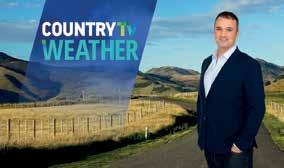


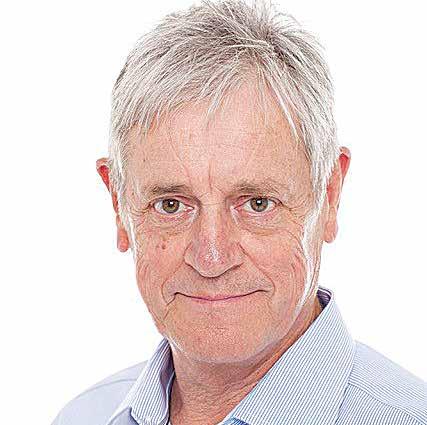
I am left wondering, what are the ’On Farm Support Team’ to do? It is a vexed question!


I think I understand that The Teams’ role will be to facilitate the reciprocal interchange of information between farmers, farm consultants, farming industries and the MPI. But nevertheless, the question begs – what will they do?
I understand that they will not act as farm advisors and consultants but confusingly I am told that the “country is short of farm advisors and we are growing the workforce”. So, what will they do?

I am told that since the MAF Advisory Service was privatised in the 1980s, central govern-

ment “lost its eyes and ears on the ground”. Still the question remains, what will The Team do? Rejuvenate the old MAF Farm Monitoring Scheme, work that is now being done, or at least I thought was being done, by Beef + Lamb and DairyNZ? He Waka Eke Noa like. Now there is a rub!
Are we really to believe that the current MPI will listen to what the “ears and eyes” are saying? Remember that MPI was given independent and indeed free science advice to the effect that Regenerative Agriculture (RA) was pseudo-science. The result? A $76m investment by MPI in RA. Good ears, good eyes! Listening?

I am told that the ‘On Farm Support Team’ will not be tasked with new and existing national MPI campaigns. That, I must say is a blessing. The thought that this 90-strong team will be out there promoting MPI’s current campaign promoting the pseudoscience of Regenerative Agriculture is a relief.

But let’s be generous for a moment and assume that The Team will find a useful productive niche in the market for their ‘services’. If this is achieved, won’t it be seen as a return, in part at least, to on-farm subsidies? I suspect farmers will not want to be tarnished with
that brush again. So, I ask again, what will The Team do?
In any case, why can’t the currently ill-defined tasks proposed to be undertaken by The Team be entrusted to the existing mature networks of farm advisors and consultants, facilitated by the $55m investment directed towards the The Team? This it seems to me would be a win-win solution to the apparent shortage of farm advisors and consultants, remembering that this important component of the farming sector has largely struggled hand-to-mouth to survive in the postRogernomics world.

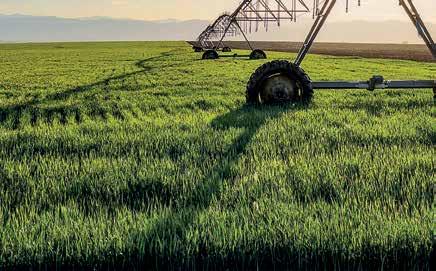
I am told that MPI will not poach privately employed farm advisors and that the majority of the new employees will be “new to this work”. God help us! It takes years of experience to develop the necessary rapport with farmers before they will take on board advice from a third party or have confidence in any advice
being offered, even if it is just as simple as suggesting that a given farmer should seek help from soand-so.
It is suggested that “On Farm Support will have input into policy development and the ability to ground truth proposed regulations”. Really? From a team of people who are “new to this work”!


Forgive my cynicism, but this function, which was carried out by a team in MAF Policy, was disbanded in 2012! Many farmers who have slugged it out over the last 20 years or so, with little positive input from government, will be entitled to hold the view that The Team are no more than “pimps” for MPI.
Farmers, if I correctly sense their mood today, are wary of any new bureaucracy, they are tired of more rules and regulation, they are sick of being told what to do, they grimace at the need for more paperwork.
So, unless The Team can alleviate some of this burden, and pack down in the scrum behind farmers, they will be wasting their time and $55m of taxpayer’s money.
• Doug Edmeades spent 20 years as a MAF soil scientist at Ruakura and in 1997 established his own science consulting business agKnowledge.
RURAL NEWS // MAY 9, 2023 18 OPINION
DOUG EDMEADES
I think I understand that The Teams’ role will be to facilitate the reciprocal interchange of information between farmers, farm consultants, farming industries and the MPI.
Talk to the leaders in water technology 03 307 9049 | rainer.co.nz The experts in farm Effluent Systems Maximise your resource efficiency and production for 2023-24 Start enjoying the economic benefits this season - internally cycle your farm nutrients GETTHE TICK Effluent systems Effluent Vibra Screen
Doug Edmeades wonders just exactly what MPI’s new ’On Farm Support Team’ will actually do.



Grab your share of more than 35,000 native trees. *Terms and conditions apply. Purchase selected Ballance Agri-Nutrients through your Farmlands Account and receive a free New Zealand native tree for every tonne of fertiliser purchased after the first 30 Tonnes. Maximum of 120 trees per shareholder. Promotional period 1st February – 31st May 2023. Please visit www.farmlands.co.nz/terms for more information. Buy Ballance Agri-Nutrients through Farmlands this autumn and get one native tree for every tonne after the first 30 tonnes.* FAR_10805 N ORFOL K RO AD NURSERY Talk to your Farmlands TFO or Ballance Nutrient Specialist today.
Research programme aims to halt pesky weed’s bite
RURAL CONTRAC-

TORS and regional councils are supporting a new AgResearch programme on invasive alligator weed.
The weed, which has plagued northern farmers and growers for many years, is now spreading south.
Dr Trevor James, a senior AgResearch scientist leading the programme, says alligator weed has been found in Northland and Auckland for more than a century. Regarded as one of the world’s worst weeds, it’s now being found in Waikato and more recently in Taranaki and further south.
Alligator weed is a
perennial plant from South American that grows in both water and soil and can form a dense mat in either.
James says there are anecdotal stories about it causing Northland kumara growers to lose two crops out of five as
~ FREE WORKSHOPS ~
OPPORTUNITIES FROM TREES
If you’re interested in trees, come and hear about the opportunities in growing trees for timber, for protecting your land and for storing carbon.
Learn about the benefits of planting different species and how they help fight climate change, provide shade and shelter, reduce erosion and improve water quality.
Free 3-hour workshops are being held in 18 locations across the country, generally 3-6 pm, on the following dates.
• Timaru Monday 8 May 2023
• Amberley Tuesday 9 May 2023
• Greymouth Wednesday 10 May 2023
• Richmond Thursday 11 May 2023
• Renwick Friday 12 May 2023
• Invercargill Monday 22 May 2023
• Balclutha Tuesday 23 May 2023
• Oamaru Wednesday 24 May 2023
• Dunedin Thursday 25 May 2023
• Stratford Monday 29 May 2023
• Bulls Tuesday 30 May 2023

• Havelock North Wednesday 31 May 2023
• GisbomeThursday 1 June 2023
• Huntly Tuesday 6 June 2023
• Te Awamutu Wednesday June 2023
• Whangarei Thursday 8 June 2023
• Kerikeri Friday 9 June 2023
• Levin Monday 12 June 2023
To register for one of these free workshops in your area please visit NZ Farm Forestry - Events (nzffa.org.nz)

has joined with Waikato and other regional councils, Kiwifruit Vine Health and other organisations to support the AgResearch effort to understand and help control alligator weed.
RCNZ president Helen Slattery says rural contractors have a major role to play in helping curb the spread of all noxious weeds.
“Our members take machinery from farm to farm and we also often send baleage and hay to other regions. So, we want to do all we can to make our members aware of the risks of spreading anything that can cause harm to our nation’s biosecurity.”
they try to spray the weed one season, then spend another trying to clear it from the soil.
“One of the first aims of the programme is to confirm or otherwise some of the anecdotal evidence coming out.”
Any impacts on stock remain unclear but the weed can certainly take over pasture and is spread by tiny plant fragments which may survive for years.
James says a beetle was introduced to control alligator weed in Northland & Auckland in the 1980s, but this may be proving less effective as the weed spreads to regions with cooler temperatures.

“We can spray the top
off – that’s the easy bit – but its underground rhizomes (roots) can grow metres away,” he explains. “We are not going to find a silver bullet to control it. The key thing is to stop the spread.”
Alligator weed was discovered in 2020 in Manawatu and the Horizons and Taranaki regional councils are now among those attempting to control the weed.
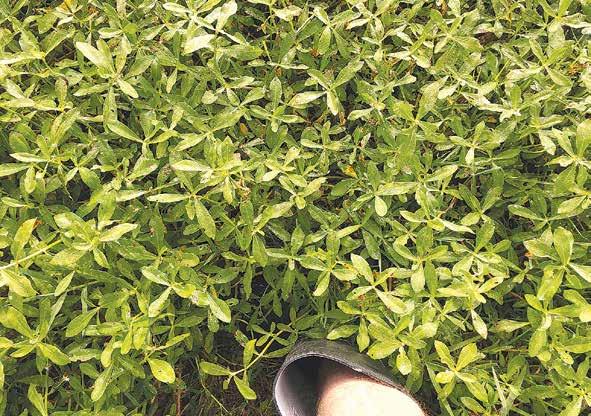
Greater Wellington’s council has it under watch for any spread into its region. Meanwhile, the Waikato Regional Council (WRC) already has an extensive effort to combat the spread of the weed.
Rural Contractors NZ
Slattery says that includes rural contractors observing machinery hygiene practices especially in areas where there are any alerts about the presence of biosecurity risks such as alligator weed or any other noxious weeds.
James says one of the first pieces of research is to test whether alligator weed can survive in baleage which is often exported by rural contractors and farmers to other regions. “Humanaided dispersal is still our biggest issue with noxious weeds.”
The AgResearch programme is being funded by MPI and the Sustainable Food and Fibres Fund, with $270,000 over three years.
RURAL NEWS // MAY 9, 2023 20 MANAGEMENT
Alligator weed, which grows in both water and soil and can form a dense mat in either, has plagued northern farmers and growers for many years and is now spreading south.
Read us until the cows come home! www.ruralnews.co.nz
“One of the first aims of the programme is to confirm or otherwise some of the anecdotal evidence coming out.”
➧ EVERYONE IS WELCOME
The workshops are being presented by the New Zealand Farm Forestry Association with support from Te Uru Rākau – New Zealand Forest Service.
‘Shearing’ NZ’s knowledge

FOUR MONGOLIAN
sheep herders have returned to their homeland with new knowledge and skills, honed in NZ, that have the potential to change their lives and reshape their home country’s shearing scene.
The four herders –Budee, Baaska, Ama and Khanda – arrived in New Zealand in early January, having done all their previous shearing using scissors, a time-consuming practice which limits the number of sheep shorn in a day to about 30. All four are now competent with an electronic handpiece and have achieved personal bests of more than 250 sheep in a day – a feat previously only achieved by one other Mongolian.
The visit was part of the ‘Share Mongolia’ initiative to introduce modern shearing techniques and equipment to Mongolia – an initiative that took flight following a chance encounter in 2019.
Rabobank agribusiness manager Paul Brough came across a group of Mongolian farmers shearing a herd of about 900 using scissors. Brough was told it would take a month to finish the job.
Given how much quicker this could be done with electronic equipment, Brough decided to discuss with work colleagues and clients establishing a training programme to help
develop Mongolian shearers’ skills with modern equipment.
Additional help came from Zoe Leetch and Enkhnasan Chuluunbaatar from Golden Bay and Roy Fraser from Colville – who had previously lived in Mongolia. They provided valuable local insights, with the ‘Share Mongolia’ initiative established in 2020. The initial plan was to run some courses with visiting New Zealand shearers in Mongolia, with the first courses taking place in 2022.
“We figured it might also be of benefit to get some of the Mongolians over this way so they could develop new skills and then take these back home,” Brough said.
“With support from
the Rabobank Community Fund, we were able to get the four herders over here and tee them up with work, lodgings and shearing gear. It has been phenomenal to see how quickly their shearing skills have progressed over the last few months.”
There were some initial challenges, given the language barrier and the significant differences between everyday life in New Zealand and Mongolia. Prior to the tour, none of the group had been on a plane or boat, used modern appliances like a dishwasher or washing machine and only one had ever been in water above his knees.
Despite the initial culture shock, the four adjusted rapidly, with the
help of an interpreter and local farmers. During the trip, the group spent time working as part of shearing gangs in Piopio, Hawke’s Bay and Wairoa.
“The people in NZ are very nice, supportive and helpful. We went from feeling like outsiders to friends within a couple of days,” Baaska said.
On the weekends, the four entered shearing competitions, including the recent New Zealand championships in Te Kuiti. They also participated in Shear 4 A Cause in West Otago in early February.
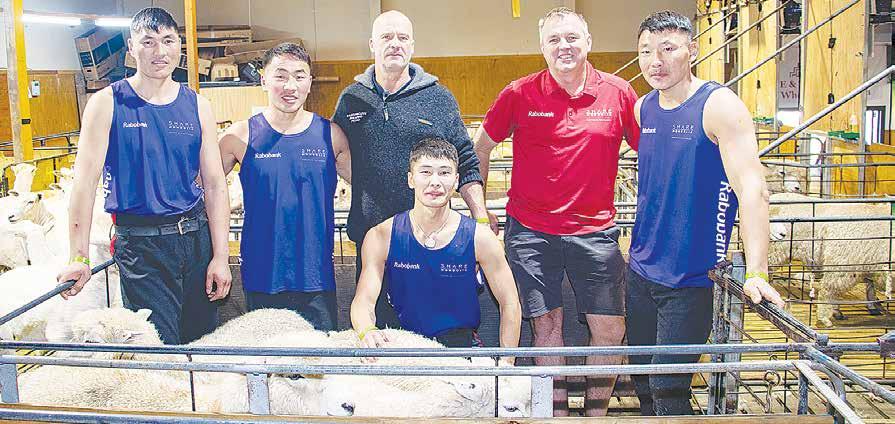
Other first-time experiences included the luge in Rotorua and surfing at Raglan. Khanda said it was hard to choose one best thing about his trip.
“The land here is
beautiful; I wish my country had the same green grass. I was proud when I shore my personal best [and] it was great to see the championship winners shear. They were so fast! We also saw trained dogs working on the farm. They are so cool!”
Brough was amazed at the Mongolians’ resourcefulness and how focused they were on learning to shear and saving money.
“Two gave up smoking when they found out the price of our cigarettes compared to the price they pay at home. They didn’t complain once and only one missed a day’s work – due to a sprained ankle,” he explained.
“With their families tucked up in their Gers (traditional Mongolian
MUCK SPREADERS



tent) back home in -40degree temperatures, it was clear at times they were missing them. But they stuck with it and they’re very excited about the opportunities their new skills will open for them and their loved ones once they are back in Mongolia.”
The four herders departed NZ in mid-April, with two mobile shearing trailers currently being built for them in Mongolia.



‘Share Mongolia’ is doing a fundraising drive to raise $8,000 to help buy shearing equipment for these trailers, so the four shearers can have their own travelling businesses.
The Mongolian shearing season is relatively short – about 60 days –
but with these new skills and equipment, the four should be able to make about $100 a day, compared to their previous bests of $15. The four are also keen to teach local farmers to use their modern equipment.
The ‘Share Mongolia’ programme aims to continue supporting Mongolian herders with further activities planned for the coming months. A team is travelling to Mongolia in June to hold eight more shearing courses funded by the United Nations, the NZ Embassy (Beijing) and the Rabobank Community Fund.
Other goals include introducing wool sorting and wool presses and a trial to test electric shearing machines on camels in the Gobi Desert.
RURAL NEWS // MAY 9, 2023 MANAGEMENT 21
LEO ARGENT
www.cochranes.co.nz Cochranes | 03 3243 791 AMBERLEY | LEESTON | ASHBURTON | TIMARU | OAMARU | WEST COAST www.gaz.co.nz Giltrap AgriZone Product Specialist | 027 203 5022 CAMBRIDGE ŌTOROHANGA ROTORUA | TAUPŌ
Mongolian herder Budee demonstrates how to shear with scissors at the Shear for A Cause event in West Otago in early February.
SLURRY SPREADERS
9000L - 27300L
Designed for premium farmers and contractors.
This rear discharge spreader excels in manure spreading.
Facing up to the FE problem
A RAPID antigen test (RAT) aimed at early detection of facial eczema (FE) in ruminants may help manage a disease that costs the New Zealand economy millions of dollars each year.


The Ministry for Primary Industries’ Sustainable Food and Fibre Futures fund is investing more than $35,000 in a project with Tokaora Diagnostics to develop a prototype FE RAT and undertake field testing. The test could be used with sheep, cattle and deer, but initial trials will focus on dairy cattle.
FE is caused by a toxin found in fungal spores that grows on dead and dying plant matter in warm, moist conditions
The damage it does to the liver causes the body to be unable to process waste and, along with a breakdown of chlorophyll in the skin, leads to heightened photosensi-
tivity. This gives the pronounced sunburn and cracked skin that gives the disease its name.
MPI’s director of investment programmes Steve Penno says that, as a liver disease, facial eczema often doesn’t show physical symptoms until it’s too late to save the animal.
“FE is a long-standing issue for our agricultural sector and with climate change it’s expected to get worse as the spores that cause the disease are more likely to grow.”
Tokaora Diagnostics is a family-owned research company. It is headed by chief researcher Frey Livingston and his mother Pam, who is the managing director. The company conducted initial research and development through start-up grants from Callaghan Innovation. It also won the Venture Taranaki Power Up Awards in 2022 and received mentoring through the Sprout Agri-
tech Accelerator programme.
Frey says they are grateful to have received so much support to bring attention to an ‘invisible’ problem.
“Right now, farmers
can test for the disease through blood samples taken by vets but it is expensive and time consuming. With our solution, farmers will be able to do the testing themselves quickly and
easily via nasal mucus or saliva.”
Frey told Rural News that current testing costs about $25 per head, with at least a day or two for the sample to be shipped to a laboratory and ana-
lysed. While Tokaora’s test is not yet in production, he is confident that they could sell it for less than $10 a test, with results expected in around 15 minutes.
Financial losses from
FE in New Zealand have been estimated as high as $274 million per year. This comes from lost production and the cost of labour, treatment and deceased animals.
Frey says that early, accurate detection of facial eczema will bring significant savings to farms in affected areas.
“It will enable farmers to surveillance test, facilitating timely treatment and allow more informed purchasing, breeding, and culling decisions. For vets, it will be a quick diagnostic tool when called to a poorly animal and for researchers it will give a timely answer to the ‘who has it and how badly’ question.”
MPI has invested in a range of projects aimed at combating FE, including breeding spore-resistant grass and working with vets, dairy farmers and rural professionals to raise awareness about how to take preventative action.
High alert for FMD
BIOSECURITY NEW Zealand says it has implemented revised border measures to manage any possible threat of foot and mouth disease (FMD) from air passengers arriving directly from Bali.
This comes with the resumption of flights from Bali to NZ with the first direct flight from Denpasar arriving in Auckland on March 30. The resumption of the seasonal service, which runs until 27 October, will bring up to 1000 passengers a week into Auckland.
Biosecurity NZ says passengers from Bali will use a dedicated biosecurity lane and baggage carousel at Auckland Airport. They will also face footwear disinfection measures, including footbaths at the arrival gate when they step off the plane.
“Biosecurity New Zealand has been working with Air New Zealand to ensure travellers receive information about the revised requirements throughout their journey – including at departure from Denpasar, during the flight and at the baggage collection area on arrival,” says Mike Inglis, Biosecu-
rity New Zealand’s northern regional commissioner.
“Passengers should expect additional questioning from our officers. If need be, they will be directed to undergo full baggage searches.
“The revised measures will minimise potential delays and disruption for air travellers while providing strong biosecurity protection for New Zealand.”
Inglis says the revised measures build on enhanced clearance processes introduced in July last year for travellers arriving on indirect flights from Indonesia, due to an FMD outbreak. The measures included a ban on personal consignments containing meat products.
“Biosecurity New Zealand takes the FMD threat very seriously, given the damage it could inflict on producers and the New Zealand economy,” he adds.
“We will continue to assess the situation in Indonesia and modify our border checks as required.”
RURAL NEWS // MAY 9, 2023 22 ANIMAL HEALTH
LEO ARGENT
RURAL ONLINE READING THE PAPER ONLINE HAS NEVER BEEN EASIER. Go to www.ruralnewsgroup.co.nz
Tokaora Diagnostics chief researcher Frey Livingston says the company has developed a rapid antigen test aimed at early detection of facial eczema.
Animal health challenges discussed
Parasites, facial eczema and dairy beef integration all challenge the red meat sector and were the subject of a panel discussion at Beef + Lamb New Zealand’s annual meeting last month.
THE DISCUSSION was facilitated by B+LNZ’s general manager of farming excellence Dan Brier.
The panel was made up of AgResearch chief scientist Dr Axel Heiser, Massey University’s Dr Nick Sneddon – the lead scientist in the Dairy Progeny Test – and Wormwise Programme manager Ginny Dodunski. All three outlined the work they were doing in their respective fields to help farmers address these issues.
Facial Eczema
Heiser explained how a large, multi-faceted programme is underway which aims to tackle the production-limiting dis-
ease that is facial eczema (FE).
He says this programme will look at the ecology of FE, genetics, spore count methods, an understanding of what the rumen does to sporidesmin (the toxin that causes FE) and the potential of a vaccine for sporidesmin.
Heiser added that the initial focus will be to carry out some fundamental science to expand their knowledge of FE and ultimately define two solutions, one pasturebased and one animalbased.
AgResearch, in conjunction with B+LNZ, is also developing a test for
FE that does not require an animal to be exposed to the toxin.
Heiser says they think they have identified a handful of markers that can be read via a blood test. However, there is still a long way to go to develop an affordable, high throughput commercial test.
Dairy beef Integration
Sneddon talked about the challenges and opportunities of integrating the dairy and beef industries through the use of beef genetics in the dairy cows.
He says dairy farmers have different requirements to beef farmers, with the former most
concerned about gestation length, calving ease and birthweight, all of which are easy to measure traits.
Conversely, beef farmers want fast growing, early maturing animals that finish well with good meat quality. There are many environmental as well as genetic factors at play, so it is harder to determine how much variation is due solely to
genetics.
The Dairy Beef Progeny Test is using genomic tools to help identify the genetics that align with the requirements of both beef and dairy farmers. There is no single breed standing out in the Dairy Beef Progeny Test with the top four bulls coming from different breeds.
Wormwise
Wormwise Programme manager and veterinarian
Ginny Dodunski outlined how the focus on internal parasite management needed to shift from a reliance on drench to a farm system approach.
She pointed out that one third of farmers surveyed had triple drench resistance. However, she added that there are farmers throughout the country who are farming successfully with minimal drench inputs and
showing what is possible. These include farmers in challenging environments such as intensive bull finishers in Northland and fine wool producers.
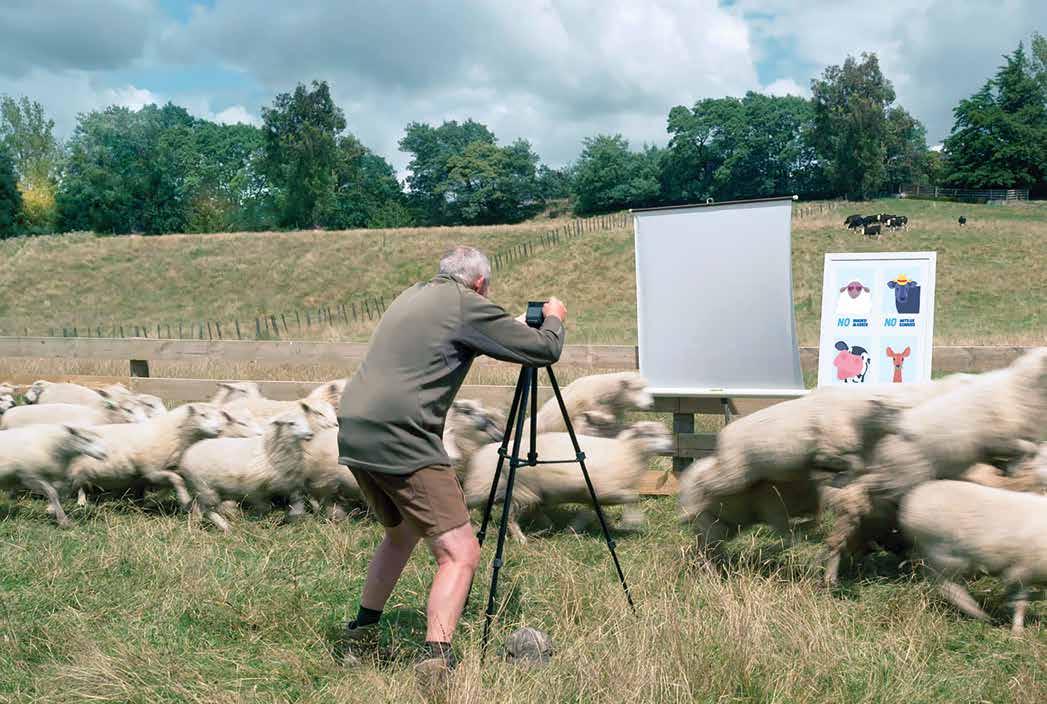
“Drench resistance wouldn’t be an issue if we set up systems that require minimal drench.”
Dodunski says Wormwise is about looking at the whole farm system and while previously its extension was delivered through workshops, the focus is now changing in response to farmers’ needs.
She added that surveys have shown farmers prefer to get advice on parasite management from their vets. So, Wormwise is working to help standardise the messages coming out of the vet industry by providing a forum for vets to learn from experts and each other.

RURAL NEWS // MAY 9, 2023 ANIMAL HEALTH 23
Wormwise Programme manager Ginny Dodunski was one of the panel members.
JD’s new partnership aims to improve harvest in-field data analysis
A NEW agreement between John Deere and Australian precision agriculture leader PCT aims to help to revolutionise in-field data analysis for grain and corn farmers in Australia and New Zealand.
Under the agreement, farmers will have the ability to take data from John Deere Operations Center and seamlessly share it with PCT Agcloud, providing further automated insights into protein and yield for grain growers. The agreement gives John Deere customers access to PCT Agcloud advanced analysis tool Protein Pro. This move
formalises and expands the relationship that John Deere and PCT Agcloud have shared for several years.

JD Australia and New
Subsoilers that
Shatter pan layers allowing surface water down through the profile Avoiding ponding & retaining moisture for use in dry periods
• Rugged high tensile blades
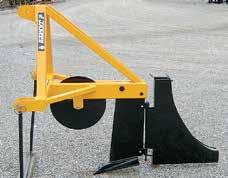
• Replacement ripper tine point (pinned on)
• Delta type wings provide increased shatter
• Large diameter skieth leaves clean cut surface
• Skieth cuts surface trash avoiding blade build up

• Optional pipe chutes
www.james-engineering.co.nz

Zealand production systems manager Ben Kelly says the relationship will automate the delivery of key insights to grain producers that can be acted upon quickly – to generate real outcomes in the field.
“Our global ambition is to improve profitability and sustainability for farmers. This agreement delivers by providing more automated insights growers can use to inform their management decisions and action in the field,” he explains.
“The partnership
works well because JD has developed accurate and reliable sensors on our equipment to collect data and PCT Agcloud offers precise and advanced analysis tools.”
For customers who have purchased a HarvestLab 3000 Protein Sensor, PCT Agcloud’s Protein Pro uses protein and yield data to create a nitrogen removal map in Operations Center. Growers and agronomists can then create prescription maps for nitrogen or other nutrients – as well as
manage protein and yield to match soil capability in future seasons, using protein to maximise profitability and minimise environmental impacts.

“Nitrogen costs have increased markedly for farmers over the past few years and is also one of the highest contributors to on-farm emissions,” Kelly adds.
“So, the partnership will help customers optimise nitrogen to maximise crop potential and profits, while also being more sustainable with their nitrogen use.”

PCT Agcloud general manager, Andrew Smart, says the company has been continuously developing advanced analytics and solutions for Australian and NZ farmers for more than 10 years, with a focus on making the technology easier to use.
He believes the partnership with John Deere will now make these solutions more widely accessible to all growers, via Operations Center.
“We see automated insights as an important
COMPRIMA PLUS BALER SERIES
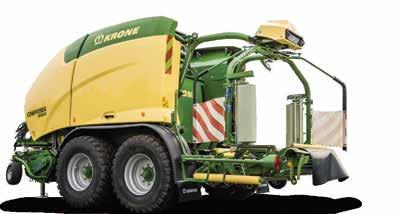
part of day-to-day decision making. Our job is to develop localised data sets and insights for each customer to create their ‘special sauce’.”
Customers will remain in full control of their data. John Deere says it understands that farmers often need to share data with other business partners and trusted advisors. The company offers the ability for this information to be shared, but only if the customer approves it.
Unique steel slat system that will bale virtually anything and is resistant to foreign object damage. Net replacement film is available on all Comprima Plus balers.
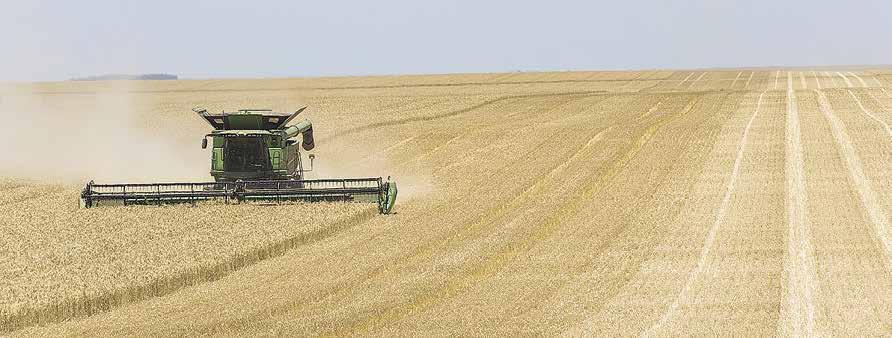
RURAL NEWS // MAY 9, 2023 24 MACHINERY & PRODUCTS
MARK DANIEL markd@ruralnews.co.nz
Farmers will have the ability to take data from JD’s Operations Center and seamlessly share it with PCT Agcloud, providing insights into protein and yield.
@rural_news facebook com/ruralnews
Comprima Plus balers utilise stronger components to combat extreme conditions and are compact, high-capacity and allround machines for all crops.
“ ”
It is easy to operate and service and it has improved hydraulics. We have always been impressed with Krone’s ability to put out consistent, high quality bales, regardless of the changeable conditions where we work. All Krone gear is built really well. It is robust and it lasts. AndrewMabey,MabeyContracting-Wairarapa/Manawatu
Standard Subsoiler & Chute For tractors up to 100hp Optional sliding back chute can lay up to 40mm alkathene ~ SOIL AERATION SPECIALISTS ~ Maitland RD5, Gore Ph / Fax: 03-207 1837 • Mobile: 027-628 5695
Let the results speak for themselves.
The
Super Subsoiler & Chute For 100 + hp tractors Optional chute lays up to 50mm alkathene CONTACT US FOR YOUR LOCAL DEALER
~ FEATURES~
Changes for Canterbury’s Claas Harvest Centres
AGRICULTURAL
MACHINERY distributor, Landpower Group, has acquired the Canterbury-based Claas Harvest Centres in Ashburton, Templeton, Timaru, Waipara, and Westland from the Carrfields Group.
Founded by Greg Carr more than 45 years ago, Carrfields Group operates numerous agribusiness companies, involved in the livestock, grain and seed, contracting, machinery, irrigation and natural fibres arenas.

Under a franchise agreement with Landpower, Carrfields has provided the Claas Harvest Centre range of machinery brands to the Canterbury, West Coast and Tasman farming communities since 1993. It has established a strong reputation for Claas, Amazone and JCB by focusing on a high level of service and support for its customers.
Following discussions between the two organisations surrounding future strategies and the outlook for the next decade, and with the franchise agreement due for renewal, Carrfields Group managing director Craig Carr said the company had decided to sell its Claas franchises.
“While it’s the end of an era for our family with the CLAAS Harvest Centre franchise,

we know our people at each location will have the opportunity to further develop their careers within the wider Landpower network.”
Landpower chief executive Richard Wilson says Canterbury’s Claas Harvest Centres will continue to be based on the local relationships at the heart of the successful regional dealerships.
“Landpower is also a family-owned business, where each branch has autonomy and a ‘run it like you own it’ mentality, so that it will be business as usual for the five Canterbury CLAAS Harvest Centres under our ownership.”
The unconditional sale, which takes effect on Monday, 3 July 2023, will see the five Canterbury Claas Harvest Centres being joined by the new Landpower Claas Harvest Centre at Yaldhurst, scheduled for completion in March 2024.
The deal includes all stock, motor vehicles, and plant and equipment, while Carrfields will retain ownership of the properties and lease them to Landpower organisation. All team members dedicated to the Claas, Amazone and JCB products sold and serviced through the Canterbury Claas Harvest Centres will be offered ongoing employment with Landpower.
Carrfields will con-
tinue operating its machinery division under the Carrfields Machinery brand, offering premium
products that are not part of the CLAAS Harvest Centre franchise provided by Landpower.
Landpower chief executive Richard Wilson says Canterbury’s Claas Harvest Centres will continue to be based on the local relationships.

JCB SERIES III

Some farmers think a telehandler is for the big farms or best suited to European or North American operations. But you’ll be surprised to know that telehandlers are the fastest growing on-farm utility category in the New Zealand market. You’ll also be surprised by what you can do with a LOADALL and how much it improves productivity on all types of farms. You won’t however be surprised to know that the JCB SERIES III is the world’s No.1 LOADALL.

RURAL NEWS // MAY 9, 2023 MACHINERY & PRODUCTS 25
MARK DANIEL markd@ruralnews.co.nz
IF YOU
IT, A JCB
III
IT. You’ll wonder how you farmed without it! JCBAGRICULTURE.CO.NZ
CAN IMAGINE
SERIES
CAN LIFT
Fully Escorted Tour Now $1,899 per person

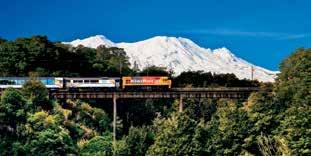

A 4 day Central Plateau winter stunner!
Zealong Tea Estate, Ohinemutu Village, Waimungu Thermal Valley-Lake Rotomahana Cruise, Honey Hive, Huka Falls, Lava Glass, Lake Taupo, Waiouru Army Museum, Christmas Dinner, Northern Explorer Rail Journey.
Enhanced Hilux hits the spot
MARK DANIEL markd@ruralnews.co.nz



THE WAR for supremacy in the ute market is still being waged by market leaders Toyota and Ford, with the Hilux and Ranger.
Much has been written about the duo, largely by urban journalists, who seem fixated on “musthaves” like Apple Car Play, touchscreens or more cup holders. Along the way, those same journalists seem to have forgotten that utes are a work vehicle that – in the last decade – have evolved for work and play. Or, if you live in the Big Smoke, play and no work.
Rural News decided to
use our test drive to put the latest Hilux in work mode. An Easter weekend dash through the centre of the North Island saw us taking in places like Te Kuiti, Taumaranui, Waiouru and Taihape. The aim of the jaunt was to collect a 1973 vintage vehicle that
CRAIGCO SENSOR JET
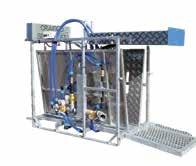

was once the epitome of rural transport – a Series 3 Land Rover.
So, let’s take a look at the new Hilux SR5 Cruiser Double Cab Wide Track Ute. First impression, from the front is a distinctly American look, with a high, broad bonnet line and wide wheel arch extensions.
It sits around 20mm higher than the previous model and has a 140mm wider wheel track than a standard Hilux. Up front there are wider A arms, longer stabiliser bars and repositioned shocks, complemented at the rear with a wider solid rear
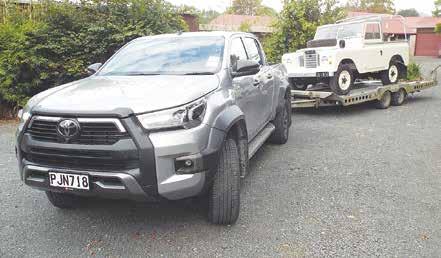
axle, a new stabiliser bar and wider placed dampers.
The layout is said to offer a 20% increase in roll rigidity and improved steering, both traits that we can certainly confirm. The Wide Track feels planted through the many curves and less than ideal road surfaces found through the King Country.
Steering feedback is informative and the vehicle is easily pointed and holds the desired line –even on poor surfaces.

The level of control is also tweaked quite dramatically with the addition of rear disc brakes, and 25mm larger diameter front units. Pulling a 6m, tandem-axle low loading trailer, with that Series 3 Land Rover aboard, momentum could


always be easily controlled.
Sporting the 4-cylinder, 2.8 litre motor used throughout the range, with power at 150kw and 500Nm torque meant that towing was a leisurely affair. Typically, the rev counter sat around 1400rpm, with cruise control at 94km/h. The only noticeable negative was an engine that appeared a little noisy on start-off. But it became noticeably quieter as revs, temperature and speed increased.
The 6-speed transmission performed well. The ride is about what you’d expect from a 3500kg capacity tow vehicle. Unloaded leaf springs on the outward journey meant there was some rebound action when hitting any of the numerous big dips on the roads. However, once loaded and homeward bound, things settled to a much more comfortable ride.
You really must take a closer look at pricing, with the Hilux offered at a driveaway price of $63,390 versus the Wildtrak at $75,990. Maybe the Ford has a few more cup holders and a nicer touchscreen display but— if you’re after a workhorse – is it worth $12.5k more?
Rubber Safety Matting




RURAL NEWS // MAY 9, 2023 26 MACHINERY
RURAL TRADER Honda GP200 Motor • 40 Bar/580 PSI • Flow Rate 41L per min • Comet APS41 Diaphragm Pump • 5D Suction Filter • Pressure Regulator & Return System 650kg Break Strength Strapping 30m Hose Reel c/w Spot 300 Spray Gun Hot dipped Galvanised Trailer Comes in 200L, 400L & 600L models Petrol & 12V Trailers available • • • • • PETROL DECK SPRAYER SIDE BY SIDE/ATV SPRAYERS TRAILED 12V SPRAYER NORTH ISLAND: 23 Mahinui St, Feilding. Ph 06-323 4181 www.mckeeplastics.co.nz SOUTH ISLAND: 35 Wilkin St, Waimate. Ph 0800 625 826 Single Dog Box – no steel work $625.00 Single Dog Box - with steel work $699.00 Wellside Dog Box $985.00 Flatdeck Dog Box $985.00 ALL PRICES INCLUDE GST BUT MAY INCUR FREIGHT NORTH ISLAND 23 Mahinui St, Feilding Ph 06-323 4181 SOUTH ISLAND 35 Wilkin St, Waimate Ph 0800 625 826 www travelwiseholidays co nz 0800 11
60 Central Plateau
Christmas 13-16
& PRODUCTS /
60
mid Winter
June 2023
Last chance. Book now! Free Range & Barn Eggs SUPPLIERS OF: • Nest boxes - manual or automated • Feed & Drinking • Plastic egg trays QUALITY PRODUCTS MADE IN EUROPE OR BY PPP ❖ A trusted name in Poultry Industry for over 50 years ❖
• Robust construction • Auto shut gate • Total 20 jets • Lambs only 5 jets • Side jets for lice • Adjustable V panels • Davey Twin Impellor Pump • 6.5 or 9.0hp motors PH 06-835 6863 • MOB 021-061 1800 JETTER VIDEO: www.craigcojetters.com SHEEP JETTERS SINCE 1992 GUARANTEED PERFORMANCE QUICK TO SETUP – EASY TO USE – JOB DONE
• ATV Carrier Mats • Exit/Entry Areas • Calf Trailers • Horse Floats & Trucks • Weigh Platforms • Bale Mats • Comfort Mats for Wet & Dry Areas • Utility Deck Matting Phone: 0800 80 8570 www.burgessmatting.co.nz
The new Hilux SR5 Cruiser Double Cab Wide Track ute is more than a workhorse.



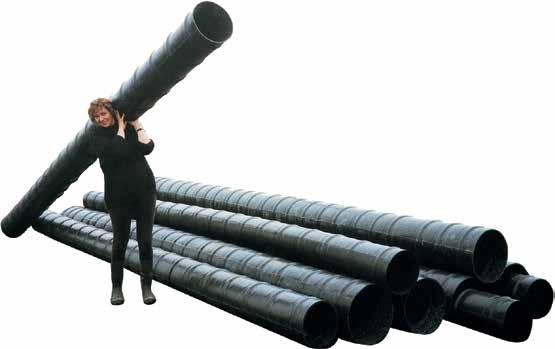




































RURAL NEWS // MAY 9, 2023 RURAL TRADER 27 www.mckeeplastics.co.nz 300mm x 6 metre $410 400mm x 6 metre $515 500mm x 6 metre $735 600mm x 6 metre $989 800mm x 6 metre $1496 1000mm x 6 metre $2325 1200mm x 6 metre $3699 ALL PRICES INCLUDE G.S.T. CULVERT PIPES NORTH ISLAND 23 Mahinui St, Feilding Ph 06-323 4181 SOUTH ISLAND 35 Wilkin St, Waimate Ph 0800 625 826 Lightweight, easy to install • Water Troughs Water Transport Water Storage Thanks to your support, Repost is proud to have re-purposed 1,450 tonnes of viticulture waste from landfill; enabling 1,510km of low-cost farm fencing from Northland to Southland. Contact us today! DURABLE RECYCLED LOW-COST NZ MADE SMART INNOVATIVE LOW-COST SUSTAINABLE FENCING Quarter Rounds unpointed Trimmed Half Rounds unpointed 1.8m $3.85 $3.25 1.6m $4.00 1.8m $3.25 1.6m We also provide pointed postsPrices exclude GST www.repost.co.nz customerservice@repost.co.nz 022 525 0130 repostnz For a Quadbar, call me, Stuart Davidson, owner of Quadbar . Email sales@quadbar.co.nz or www.quadbar.co.nz QUADBAR Proven beyond doubt! “I have no doubt that if I did not have a Quadbar fitted, my accident would have been fatal!” – Rozel Farms “The Quadbar saved our employee from significant injuries.” –Colin van der Geest tunnel houses www.morrifield.com t/f 03 214 4262 | e info@morrifield.com Grow vegetables all year round T Very affordable and easy to install T New Zealand designed and made T 40 years producing tunnel houses T Range of models sized from 2m - 10m T Beautiful New Zealand grown, cold pressed, internationally certified Extra Virgin Olive Oil. www.twooldsoldiers.co.nz EXTRA VIRGIN OLIVE OIL New Zealand 250 ml Invest in your safety The world’s first flexible roll bar 0800 782 376 traxequipment.co.nz Rebate Available $1440 + GST & Freight FLY OR LICE PROBLEMS? The magic eye sheepjetter since 1989 Quality construction and options • Get the contractors choice 07 573 8512 | dipping@electrodip.co.nz – www.electrodip.com Featuring... • Incredible chemical economy • Amazing ease 1500+ per hour • Unique self adjusting sides • Environmentally and user friendly • Automatically activated • Proven effective on lice as well as fly • Compatible with all dip chemicals • Accurate, effective application LASER FF95 DIESEL HEATER 0800 379 247 www avonheating co nz ü Huge 9.5kW output. ü Made in Japan since 1991. ü Energy Efficient - 92% certified ü Safe, convenient and easy to useno mess, no fuss. ü DIY Install or we can arrange. ü No wood to cut, cart or store. ü NO indoor d esel odours Get up-to-date news at www.ruralnewsgroup.co.nz LATEST STORIES EVERY DAY NEW! BUFFALO BOOTS RAINWEAR sale ends soon JACKET BIB OVERALLS LEGGINGS 100% Waterproof Flexible Fleece Collar Hood Visor Acid Resistant Durable Seams Stitched On Soles Plain Toe or Steel Toe 175% more crack resistant than normal leather Buffalo Leather earthwalk.co.nz 0800 16 00 24 9am-5pm PHONE BUY sizes: BOOTS 5 - 13 (NZ) RAINWEAR XS - 4XL free shipping $145 $140 New Zealand owned & operated NEW - WIDER TOE BOX NEW - WIDER STEEL CAP ** NEW - KEVLAR PENETRATION RESISTANT SOLE ** NEW - 250 DEGREE HEAT RESISTANT OUTSOLE NEW - BALL BEARING SPEED LACING NEW - FLEXIBLE RAND NEW - STRONGER OUTSOLE STITCHING NEW - STRONGER MIDSOLE NEW - STRONGER FORESTRY GRADE SHANK (**safety models) $120 $100 $90 valued at $320 valued at $280 valued at $230
Stacey Waaka
Rugby superstar and world cup winner
Stacey knows how important it is to fuel her body with the right stuff, which is why she’s joining Beef + Lamb New Zealand to remind Kiwis that the quality, taste, and nutrition of New Zealand beef and lamb is second to none.

There are many good things in life we can all identify with: triumphs in sport, family barbecues, and holidays to name a few. These are made even more memorable centered around a delicious meal of beef or lamb.
With Stacey on our team, we’ll transport Kiwis back to cherished moments, reconnect them to their love of New Zealand beef and lamb, and instil pride in our farmers and world-leading farm practices.
Visit us at beeflambnz.co.nz to find out more
MEET
























































































































































































